Ahmadiyya Archive & Research Centre (ARC), 22 Deer Park Road, London, SW19 3TL, UK info@alhakam.org | ISSN 2754-7396









Ahmadiyya Archive & Research Centre (ARC), 22 Deer Park Road, London, SW19 3TL, UK info@alhakam.org | ISSN 2754-7396








Islamabad, UK, 25 December 2022: At around 10:30 am GMT, Hazrat Mirza Masroor Ahmad, Khalifatul Masih V, may Allah be his Helper, arrived at the Masroor Hall, Islamabad, UK for the concluding session of Jalsa Salana Qadian 2022.
Hazrat Amirul Momineenaa had already announced during his Friday Sermon on 23 December 2022 that he would address the 127th Jalsa Salana Qadian on Sunday and that about seven to eight African countries were also holding their annual conventions simultaneously. He had said that they would also be made part of his address through Muslim Television Ahmadiyya International. Hence, not only was a live feed set up between Islamabad, UK and Qadian, India, but most of the aforementioned countries were also connected via video links, creating a truly global atmosphere. Moreover, Ahmadis across the world tuned in through MTA for Huzoor’saa concluding address.
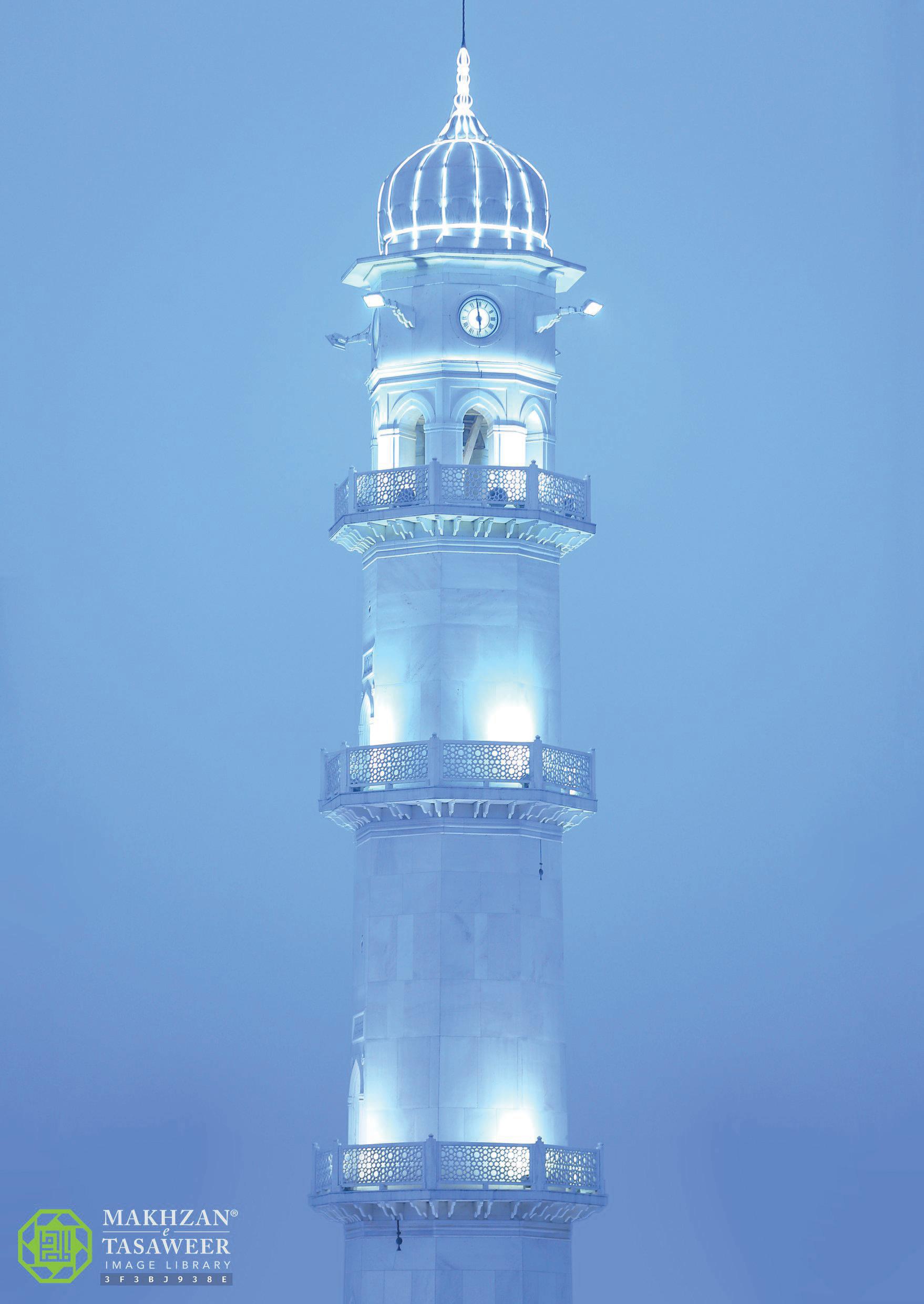
After his arrival, Huzooraa invited Feroz Alam Sahib to recite a portion of the Holy Quran and to present its Urdu translation. He recited verses 285 to 287 of Surah alBaqarah. Following this, Nasir Ali Usman Sahib was invited to recite an Urdu poem composed by the Promised Messiahas in praise of Allah the Exalted.
Hazrat Khalifatul Masih Vaa then took to the podium to deliver the concluding address of Jalsa Salana Qadian 2022.
After reciting tashahud, ta‘awuz and Surah al-Fatihah, Hazrat Khalifatul Masihaa said, by the grace of Allah the Exalted, it was the last day of Jalsa Salana Qadian and that some African countries were also holding their jalsas simultaneously. Those included Nigeria, Ivory Coast, Guinea-Bissau,
Hadith-e-Rasul – Sayings of the Holy Prophet Muhammadsa
Hazrat Jarirra narrates that the Holy Prophet, peace and blessings of Allah be upon him, said:
“Whoever is deprived of kindness, he is deprived of goodness.”
(Sahih Muslim, Kitab al-Birr wa-s-silah wa-ladab, Hadith 2592)
“Though I am cognisant that people only gradually find the ability to serve by action, there is no doubt that a person’s actions strengthen in proportion to a person’s strength in faith. This is to such an extent that when a believer’s strength in faith matures and develops fully, they reach the station of a martyr (shaheed) because nothing can stand in their way. Such an individual is not hesitant or reluctant even to sacrifice their dear life.” (Hazrat Mirza Ghulam Ahmadas, Malfuzat, Vol. II, p. 56)
There is nothing until one possesses strong faith
<< Continued from previous page
Guinea-Conakry, Togo, Burkina Faso, Mali and Zimbabwe. Huzooraa added that, by His grace, Allah the Almighty had, through the means of MTA, enabled us all to be interconnected, as many of those countries had been able to join in with us virtually.
Allah had enabled us to see and listen to one another. Huzooraa added, “At the exact same time, all these countries are able to listen to my words, are able to see us and we are able to see them. This is also the fulfilment of the promise of Allah the Almighty to the Promised Messiahas.”
Huzooraa then narrated some of the history of Jalsa Salana, especially shedding light on the very first jalsas that took place during the life of the Promised Messiahas. Huzooraa stressed that the objective of those jalsas was to “progress in religious, spiritual and moral pursuits.”
Huzooraa said, it was with these objectives in mind that the Ahmadiyya Muslim Community held its conventions across the world. Huzooraa said it was a sign of Allah’s help and support for the Promised Messiahas that the Jalsa Salana which started with humble beginnings had become an ever-progressing global phenomenon. Those who raised questions were blind to the truth, otherwise, this alone should be enough for them to prove how Allah the Almighty was supporting and blessing the mission of the Promised Messiahas
Huzooraa then narrated some of the history of Jalsa Salana, especially shedding light on the very first jalsas that took place during the life of the Promised Messiahas. Huzooraa stressed that the objective of those jalsas was to “progress in religious, spiritual and moral pursuits.”
Huzooraa said, it was with these objectives in mind that the Ahmadiyya Muslim Community held its conventions across the world. Huzooraa said it was a sign of Allah’s help and support for the Promised Messiahas that the Jalsa Salana which started with humble beginnings had become an ever-progressing global phenomenon.

Those who raised questions were blind to the truth, otherwise, this alone should be
enough for them to prove how Allah the Almighty was supporting and blessing the mission of the Promised Messiahas
Huzooraa then brought home the point and asked, “What are our duties after having witnessed these blessings? We have gathered together for the Jalsa Salana and people all around the world are listening to this Jalsa Salana. They are observing the scenes. However, in order to continue to partake of the blessings of Allah the Exalted, we will also have to fulfil our duties. We have made a promise and a pledge of bai‘at with the Promised Messiahas by joining the Ahmadiyya Muslim Community. We are duty-bound to fulfil that pledge. In order to do this, we will have to bring about pious changes in us.”
Drawing the attention of Ahmadis around the globe to some of the objectives of bai‘at – especially focusing on the second condition – Huzooraa said, “If we mould our lives according to this, we will witness a revolution taking place in our lives and in the world at large.”
“The second condition of the bai‘at is, ‘That he/she shall keep away from falsehood, fornication/adultery, trespasses of the eye, debauchery, dissipation, cruelty, dishonesty, mischief and rebellion; and that he/she will not permit himself/herself to be carried away by passions, however strong they might be.’ The Promised Messiahas has mentioned nine evils in this and has drawn our attention towards them. When one abandons and shuns these nine evils, one is able to progress in spirituality,” Huzooraa said.
Regarding falsehood, Huzooraa quoted and explained the following verse of the Holy Quran:
“Shun therefore the abomination of idols, and shun all words of untruth.” (Surah al-Hajj, Ch. 22:V.31)
Huzooraa said, the Promised Messiahas had explained that the uttering of falsehood was tantamount to shirk i.e. associating partners with God and that the Holy Quran had stressed truthfulness even
if it was at the expense of testifying against one’s relatives. (Surah an-Nisa, Ch.4:V.136) This was the standard of truthfulness that every Ahmadi should try their utmost to adhere to. And we needed to undertake detailed self-analysis in this regard.
Huzooraa also quoted a hadith of the Holy Prophetsa in which he declared falsehood to be the greatest of all evils. Huzooraa admonished that we ought to keep the standard of the truthfulness of the Holy Propehtsa in mind, who would not lie even by way of jest and used to say, ‘Adopt truthfulness because truthfulness leads towards virtue, and virtue leads to Paradise. Avoid falsehood because falsehood leads to disobedience, and disobedience conveys one to Hell.’ The Holy Prophetsa had also said, ‘Whoever has the following characteristics, is a hypocrite: When he speaks, he tells a lie, when he makes a contract, he breaks it; and when he makes a promise, he breaks it.’
With reference to the sayings of the Promised Messiahas, Huzooraa further elaborated on the importance of shunning falsehood and adopting truth. The Promised Messiahaa had said, generally, people of the world said that one who told the truth, was caught or imprisoned. However, the reason truthful people suffered punishment, was not that they were honest, rather, it was because they had some other concealed vices in them. Allah knew each of our vices. Hence, Huzooraa said, we ought to always seek forgiveness (istighfar) from Allah the Almighty.
Huzooraa said, “In today’s society, we see people lying at every step. Seeing this, some may think that perhaps, saying something wrong to a minor extent occasionally may not be a sin and may hence not be harmful. However, it is such an attitude that actually leads to even greater falsehoods and one slowly loses the importance of telling the truth. Thus, every single Ahmadi must increase the level of truthfulness to the highest possible standards. If we achieved those standards, many of our disagreements would also vanish.”
Next, Huzooraa said, the Promised
Messiahas had admonished us to keep away from adultery or fornication in this second condition of bai‘at
“In today’s society, the media has promoted and spread adultery beyond all limits. Under such circumstances, we have to save ourselves as well as our children and we will have to make special efforts in doing so,” Huzooraa said.
Huzooraa then quoted the following verse of the Holy Quran: الیبس ءآسو ؕ ۃشحاف
“And come not near unto adultery; surely, it is a foul thing and an evil way.” (Surah Bani Israil, Ch.17: V.33)
“What is the media doing today? They are now broadcasting children’s programmes that are poisoning their minds. Under such circumstances, it is something that we have to be really worried about. We have to exert immense efforts in this regard.” Huzooraa said.
Explaining that zina did not only entail the obvious act of adultery or fornication but also included all of the things that may ultimately lead one to this evil, including indecent movies or indecent thoughts. Moreover, Allah the Exalted had also stated:
“Those who love that immorality should spread among the believers, will have a painful punishment in this world and the Hereafter. And Allah knows, and you know not.” (Surah al-Nur, Ch. 24: V. 20)
Huzooraa said, those who followed these filthy ways, often had to suffer all types of diseases. And in terms of the hereafter, only Allah knew the intensity and the extent of the punishment they would receive.
“So, where we have to purify the society from this evil, which is spiralling and rapidly spreading to unimaginable degrees, and where we have to save our children, our families and our relatives, there we will also have to try to admonish other people. In fact, the truth of the matter is that this is also an aspect or rather, the very agenda of those who are promoting atheism. This is one of the strategies that they are using to try and move people away from religion and God. So, we also have to carry out an immense self-struggle against this.”
With reference to the ahadith and the writings of the Promised Messiahas, Huzooraa further elaborated on this point and prayed, “May Allah, the Almighty give sense to the world and enable them to listen to our message. May we be able to spread the message and be saved from these evil ways.”
next evil, Huzooraa shed light on was the trespassing of the eyes and quoted the following verses in this regard:
“Say to the believing men that they restrain their eyes and guard their private parts. That is purer for them. Surely, Allah is well aware of what they do. And say to the believing women that they restrain their eyes and guard their private parts, and that they disclose not their [natural and artificial] beauty except that which is apparent thereof, and that they draw their head-coverings over their bosoms, and that they disclose not their beauty save to their husbands, or to their fathers, or the fathers of their husbands or their sons or the sons of their husbands or their brothers, or the sons of their brothers, or the sons of their sisters, or their women, or what their right hands possess, or such of male attendants as have no sexual appetite, or young children who have no knowledge of the hidden parts of women. And they strike not their feet so that what they hide of their ornaments may become known. And turn ye to Allah all together, O believers, that you may succeed.”
(Surah al-Nur, Ch.24: V.31-32)
Huzooraa further explained the verse with writings of the Promised Messiahas and said, “Men and women, both have been instructed by Islam to cast their gaze down and the Holy Quran has established a lasting standard of chastity. It is only by following that standard, that we can establish a pure society.”
In this regard, Huzooraa presented a hadith of the Holy Prophetsa in which it is narrated that when a bind companion came to the Holy Prophetsa, he instructed his wives to observe purdah. Upon this, the ladies said, the companion was blind but the Holy Prophetsa replied, “Are you two blind too?” Huzooraa added, “This is the standard the Holy Prophetsa wanted to establish. This incident also provides a reply to such people – be it men or women – who say, or some Ahmadi also raise this question, that the Jamaat was too strict with regards to purdah.”
The next evil mentioned in the second condition of bai‘at, Huzooraa said, was debauchery and dissipation, about which Allah stated:
“And on the day when those who disbelieve will be brought before the Fire, [it will be said to them], ‘You exhausted your good things in the life of the world, and you [fully] enjoyed them. Now this day you shall be requited with ignominious punishment because you were arrogant in the earth without justification, and because you acted rebelliously.’” (Surah al-Ahqaf, Ch.46:V.21)
With regards to parenting, Huzooraa said, the Promised Messiahas had admonished, if a person expressed his desire to have righteous children, it would be considered a half-hearted and hollow desire until that person first brought upon a righteous change in himself. If he was engaged in debauchery and dissipation and expressed wishes to have pious children, he would be a great liar.
Huzooraa went on to shed light on the evil of cruelty that we have pledged to keep away from and quoted the following verse of the Holy Quran in this regard:
“So woe to the wrongdoers because of the punishment of a grievous day.” (Surah az-Zukhruf, Ch. 43: V. 66)
arrogantly towards anyone even if he is your subordinate, and revile not anyone even if he should revile you. Become humble, tolerant, well-intentioned and compassionate towards God’s creation so that you may be accepted by God.
“There are many who show meekness, but they are wolves from within. There are many who outwardly appear clean, but from within they are serpents. You, therefore, cannot be accepted by God unless you are the same inside and out. If you are above others, have mercy on the lowly and do not look down upon them. If you are learned, counsel the ignorant and do not degrade them with disdain. If you are wealthy, serve the poor, and do not treat them with arrogance and self-conceit. […]
“Part with your ego in every way and do away with mutual grievances. Be humble like the guilty, though truth be on your side, so that you may be forgiven. Do not feed your vanity, for those who are bloated cannot enter the gate to which you have been called.
Next, Huzooraa spoke on dishonesty and quoted the following verse of the Holy Quran in this regard:
“And plead not on behalf of those who are dishonest to themselves. Surely, Allah loves not one who is perfidious [and] a great sinner.” (Surah an-Nisa, Ch. 4: V. 108)
“Here, we also need to assess whether we are doing justice to fulfilling the rights that we owe with regards to our bai‘at. Or are we being guilty of any kind of perfidiousness in this regard,” Huzooraa said. The Holy Prophetsa used to seek God’s protection from these things, Huzooraa said.
Huzooraa then presented various pieces of admonition from the sayings and writings of the Promised Messiahas in this regard, including the following:
“‘We are surely going to bring down on the people of this town a punishment from heaven, for they have been rebellious.’” (Surah al-‘Ankabut, Ch. 29: V. 35)
Huzooraa said, “This is something we should be deeply concerned about. We should always do istighfar i.e., seek forgiveness for our sins and try to stay in the refuge of Allah. This kind of fisq has been spread everywhere in the world these days.” Huzooraa then quoted the following verse of the Holy Quran:
Moreover, Huzooraa said, the Holy Prophetsa had declared in some ahadith that poverty in the eyes of people meant a lack of wealth but those of his ummah would be considered true paupers on the Day of Judgement, who, although had observed salat and fasting etc. but had also committed cruelty against people, because their good deeds would be transferred to those against whom they had committed any cruelty.
In this regard, Huzooraa also presented the following quote from the writings of the Promised Messiahas:
“Show mercy to His servants and do not wrong them by your tongue or your hand or by any other means, and strive for the welfare of God’s creation. Behave not
“How unfortunate is the one who does not believe in that which has come from the mouth of God and which I have set forth. If you desire that God should be pleased with you in heaven, unite with one another as though you were brothers from the same womb. The one who most forgives the transgressions of his brother is the more honourable among you. Unfortunate is the one who is obstinate and does not forgive. Such a person has no part in me. Be very fearful of God’s curse, for He is Holy and Jealous. An evildoer cannot attain nearness to God. One who is arrogant cannot attain nearness to God. A wrongdoer cannot attain nearness to God. He who is unfaithful cannot attain nearness to God. […]
“Have mercy on your subordinates and your wives and your less fortunate brethren so that you too may be shown mercy in heaven.”
“Whosoever does not repent of every vice and every evil deed, such as drunkenness, gambling, lustful glances, deceit, bribery and every misappropriation, is not of my community. […] Every husband who deceives his wife, and every wife who deceives her husband, is not of my community.”
With regards to dishonesty in financial dealings and non-repayment of debts, Huzooraa said that Islam condemned this in the strongest of terms, so much so that the Holy Prophetsa did not use to offer the funeral prayer of a person who was guilty of such vices.
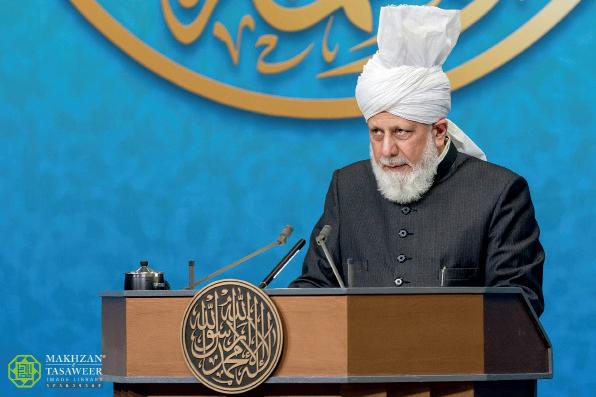
Then, Huzooraa spoke on mischief and presented the following verse in this regard:
31 December 2004:
During his Friday Sermon on this day, delivered from the Baitus Salam Mosque in Paris, France, Hazrat Khalifatul Masih Vaa gave valuable guidance in regards to electing Jamaat officebearers and shed light on the responsibilities of office-bearers. Huzooraa said that the nizam (system) of the whole Jamaat revolved around the institution of Khilafat.
30 DECEMBER 2005: During his Friday Sermon on this day, delivered from Qadian, Hazrat Khalifatul Masih Vaa instructed the Jamaat to express gratitude to Allah for enabling them to hold a successful Jalsa Salana Qadian, India. Huzooraa said that
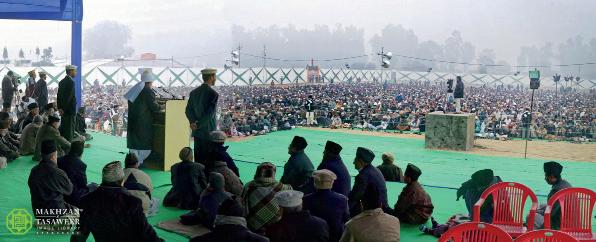
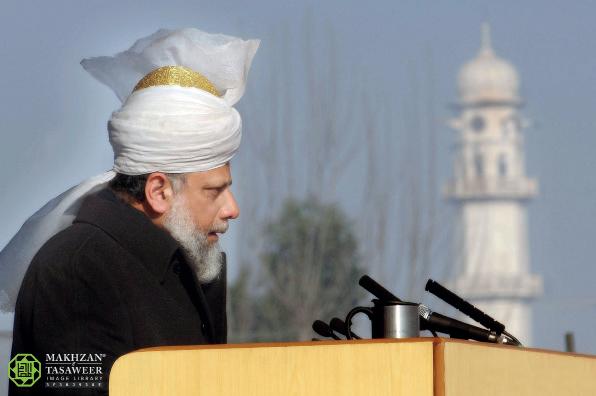
the first-ever Jalsa Qadian was attended by only 75 members; however, through the prayers of the Promised Messiahas, Allah had blessed that Jalsa and that this year’s Jalsa was attended by around 70,000 people.
30 December 2016: During his Friday Sermon on this day, Hazrat Khalifatul Masih Vaa shed light on the Islamic teachings in regard to
On the same day, Huzooraa also granted an audience to the ‘amila [executive committee] of Lajna Imaillah France, and gave valuable guidance to them.


31 December 2010: During his Friday Sermon on this day, Hazrat Khalifatul Masih Vaa said that the year 2010 had commenced with a Friday and it was ending on a
Friday as well, which is a blessed day. Huzooraa said that the sacrifices of lives that had been made by the martyrs of Pakistan, especially during the year 2010, would never go in vain.
31 December 2017:
Hazrat Khalifatul Masih Vaa addressed the concluding session of the Jalsa Salana Qadian, India, via satellite link from the Baitul Futuh Mosque, London, UK. Over 20,000 people from 44 countries attended the Jalsa Qadian, while more than 5,000 gathered in London for the concluding session.
During his address, Huzooraa explained the true meaning of the title, ‘Seal of the Prophets’ given to the Holy Prophet Muhammadsa in the Holy Quran.
1 January 2006: During his tour of India, Hazrat Khalifatul Masih Vaa visited various institutions, buildings, and places of
the Jamaat in Qadian, India. Huzooraa also granted an audience to 1348 Ahmadis, who had come from 6 different countries.
2 January 2006: During his tour of India, Hazrat Khalifatul Masih Vaa visited various places in Qadian, including Talim-ul-Islam College, Noor Mosque, Boarding Tahrik-e-Jadid, SS Bajwa School, Kothi Darus Salam, Noor Hospital, Aqsa Mosque and the Ahmadiyya Central Library, etc.
2 January 2015: During his Friday Sermon on this day, Hazrat Khalifatul Masih Vaa mentioned Luqman Shahzad Sahib of District Gujranwala, Pakistan, who had been martyred on 27 December 2014. He was born in 1989, and accepted Ahmadiyyat in 2007. He was the first Ahmadi in his family, and had to suffer severe opposition thereafter. He was serving as the local finance secretary in Bhari Shah Rahman.
Huzooraa also mentioned Scherher Zada Destanouska Sahiba of Macedonia, who passed away on 19 November 2014. She had accepted Ahmadiyyat in 1996.
3 January 2006: During his tour of India, Hazrat Khalifatul Masih Vaa granted private audiences to 2442 Ahmadis in Qadian, India.
3 January 2014: During his Friday Sermon on this day, Hazrat Khalifatul Masih Vaa mentioned Yusuf Latif Sahib of Boston, USA, who had passed away on 23 September 2013 at the age of 93. He had accepted Ahmadiyyat in
1948, and was amongst the early Afro-American Ahmadis. He was the author of various books. Once, President Clinton invited him to the White House, and Yusuf Sahib attended the event wearing shalwar kameez.
4 January 2005: During his tour of Spain, Hazrat Khalifatul Masih Vaa travelled to visit the historic mosque and palaces in Cordoba.
4 January 2013: During his Friday Sermon on this day, Hazrat Khalifatul Masih Vaa instructed the Jamaat to pray for the Ahmadis in Libya, who were facing severe opposition there. Several Ahmadis had been captured and tortured as well.
5 January 2005: During his tour of Spain, Hazrat Khalifatul Masih Vaa visited the Alhambra Palace in Granada, Spain.
5 January 2007: During his Friday Sermon on this day, delivered from Nunspeet, the Netherlands, Hazrat Khalifatul Masih Vaa instructed the local Ahmadis to pay attention to building mosques.
5 January 2018: The then leader of the Liberal Democrats Party, Sir Vince Cable MP visited the Baitul Futuh Mosque in Morden, UK, where he met Hazrat Khalifatul Masih Vaa. Also present at the meeting was Sir Edward Davey MP. Following the conclusion of their audience with Huzoor aa , Sir Vince Cable and Sir Edward Davey were given a tour of the Baitul Futuh Mosque complex.

“‘And seek, in that which Allah has given thee, the Home of the Hereafter; and neglect not thy lot in this world; and do good [to others] as Allah has done good to thee; and seek not to make mischief in the earth, verily Allah loves not those who make mischief.’” (Surah al-Qasas, Ch.28:V.78)
Huzooraa elaborated on this point with a hadith and said, Muslims of today were making themselves guilty of mischief [fasad] by engaging in the killing of fellow Muslims. Huzooraa prayed, “May Allah have mercy on the Muslim ummah and allow us to fulfil our duty of conveying the message of the Promised Messiahas to them. May Allah enable them [the non-Ahmadis] to accept him.”
Finally, Huzooraa spoke on rebellion and presented the following verse in this regard:
anger in view of Islamic teachings.
“This is our way of life and code of conduct. If we act upon this, then, as I said earlier, we would be able to bring about a great revolution. Every condition of bai‘at is based on immense wisdom. An Ahmadi should continue to ponder over them in order to strengthen and refine their faith. Only then will we be able to do justice to the requirements of bai‘at,” Huzooraa said.
“O ye who believe! obey Allah, and obey [His] Messenger and those who are in authority among you. And if you differ in anything among yourselves, refer it to Allah and [His] Messenger if you are believers in Allah and the Last Day. That is best and most commendable in the end.” (Surah anNisa, Ch.4:V.60)
“This means that you should judge, pass verdicts and make decisions according to the teaching of God and His Messengersa That teaching was that one should inform the ruling government of their mistake. However, if they do not accept it, then leave the matter with Allah the Exalted. Then, Allah will deal with them as He Himself desires. However, one should also continue to pray for them that Allah the Exalted may enable them to act upon justice,” Huzooraa said.
In view of the sayings of the Holy Prophetsa and the Promised Messiahas, Huzooraa further stressed the importance of maintaining peace in the land and not spreading any kind of discord. Huzooraa also elaborated on the significance of controlling
With regard to the centenary of Lajna Imaillah, Hazrat Khalifatul Masih Vaa said, “Today, a hundred years have passed since the establishment of Lajna Imaillah as an auxiliary organisation of the Community. Lajna [members] should remember to undertake an analysis of the past hundred years to see as to what extent they have brought about a pious transformation within themselves, done justice to the pledge of bai‘at, made efforts in this regard, and to what extent they helped their children and progeny to understand, become attached to and accept the claims of the Promised Messiahas and do justice to their bai‘at If they have brought their children up in this manner, then certainly, the members of Lajna Imaillah are grateful servants of Allah the Exalted. Thus, it is necessary to make these assessments today. Then, if any shortcomings are identified, you should make a firm resolve that, ‘We shall enter the next century of Lajna Imaillah with this resolution that we shall mould our offspring to become such that they do justice to their pledge of bai‘at.’ May Allah enable all to do so.”

In the end, Huzooraa announced that about 14,500 attendees were present in the Jalsa gah of Qadian, India and 37 countries were represented there. Huzooraa prayed for all the attendees of Jalsa Salana Qadian, and those of other jalsas around the world, before leading everyone in silent prayer. Hazrat Amirul Momineenaa then permitted taranay (choral poems) to be recited.
Huzooraa then conveyed his salaam and Jalsa Salana Qadian 2022 came to a successful end.
(Report prepared by Al Hakam)Guidance regarding basic Islamic issues – which Hazrat Amirul Momineen, Khalifatul Masih Vaa, has given on various occasions in his written correspondence and during MTA programmes – is being officially published below for everyone’s benefit.
Jinn
Someone from Jordan asked Hazrat Amirul Momineen, Khalifatul Masih Vaa, a question about the following verse of Surah ar-Rahman: نآج ال و مہلبق سن ا نہﺜمطی مل [“... whom neither man nor Jinn will have touched before them…” (Surah arRahman, Ch.55: V.57]
He asked what the term “ jinn ”, mentioned in this verse, meant. Huzoore-Anwar aa, in his letter dated 18 October 2021, provided the following answer to
• j u n u n [ نونج] refers to the illness which covers the intellect.
• j i n a n [ نانج] denotes the heart, hidden in one’s chest.
• j a nn ah [ ۃنج] is the garden, whose thick shade from the trees covers the soil.
• ma j a nn ah [ ۃنجم] refers to the shield behind which the warrior hides.
• j aa nn [ ناج] is applied to the snakes that live in hiding in the ground.
• j a n a n [ ننج] refers to the tomb that hides the dead in itself.
al-Bukhari , Kitab al-manaqib, Bab dhikri l-jinn)
“Furthermore, the word jinn is also used for hidden evil spirits, i.e., Satan and for the hidden good spirits, i.e., angels as has been stated that: کِل ذ نو د انم و نوحِلاصلا انم
“[‘Some of us are righteous and some of us are otherwise.’] (Surah al-Jinn, Ch. 72: V. 12)
“Thus, as mentioned above, the word will have different meanings depending on the context. In your question, you have quoted the following verse of Surah ar-Rahman: ناج ال و مہلبق سنإ نہﺜمطی مل
“[‘... whom neither man nor Jinn will have touched before them…’ (Surah arRahman, Ch.55: V.57]

“The word ‘ jinn ’, which has been used in this verse in contrast to ‘ ins ’, denotes the elite, those of great rank and position, the rich, chieftains and leaders. And the meaning of the verse is that Allah the Exalted has prepared such heavenly gardens for His righteous servants in which there will be such unique blessings that will be exclusively for those dwellers of Paradise and before them, these blessings would have been beyond the reach of the ordinary as well as the elite.”
In that dialogue, the esteemed professor posed a series of questions to Huzoor as about a wide range of topics, including the nature of God, the advent of prophets, the universe, the motivators of good and evil, Satan, the lives of this world and of the hereafter, the relationship of humans with their souls, the sacrifice of the lower for the higher, animals and their souls and the issue of evolution, etc. Huzoor as gave very insightful answers to those questions. In addition to shedding light on the various aspects of these topics, he also clarified the difference between humans and animals with regard to intellect, various kinds of suffering, feelings and their actions in this world, as well as the recompense they will receive in the afterlife. Thus, in response to one of the questions, Huzoor as said:
“‘This world is a limited world. God has set up a vast realm to follow this one, wherein He has desired and promised that true and everlasting prosperity will be awarded. Every suffering that exists in this world will be redressed and compensated in the other realm. Any shortcoming that is found in this world will be made whole in the next world.
this question:
“The word jinn is frequently used in the Holy Quran and the ahadith of the Holy Prophet sa with various connotations. The precise meaning of the word is determined by its context. Generally, the word jinn means something that is hidden, whether it is hidden owing to its form or its behaviour. The word takes on numerous connotations as it changes cases or is inflected in other ways. Nevertheless, the concept of being hidden or obscure is common across all of these connotations.
“The following words, for example, that are derived from the root j-n-n , carry the above-mentioned connotation:
• j a nn a [ نج], for example, means ‘to cast a shadow’ or ‘to cast a mantle of darkness’.
• j a n i n [ نینج] is the foetus hidden in the mother’s womb.
• j u nn ah [ ۃنج] applies to the veil that covers the head and the body.
“Moreover, the word jinn is also used for veiled women. It is also used for such chieftains and the elite who do not mix with the public. It is also used for people of nations that live in geographically remote areas and are cut off from the rest of the world.
“Similarly, the word [ jinn ] is also used for nocturnal animals that stay in the dark and for very small insects or microorganisms such as germs etc. That is why the Holy Prophet sa instructed that eating utensils be kept covered at night. ( Sahih Muslim , Kitab al-ashribah, Bab al’amri bi taghtiyati l-ina’i wa ika’i s-siqa’i wa ighlaqi l-abwab) He also forbade the usage of bones for cleaning after attending to the call of nature and said that they were the food of the jinn , i.e., ants, termites and other bacteria. ( Sahih
Someone from Canada sent a saying of the Promised Messiah regarding the survival of animals’ souls after their death to Hazrat Amirul Momineen, Khalifatul Masih V aa. The person also wrote that Huzoor aa had said during a Waqf-e-Nau class that animals’ souls did not live on after their deaths, rather they also died in this world. He asked how one could reconcile both of these statements. Huzoor-e-Anwar , in his letter dated 19 October 2021, gave the following reply to this question:
“The dialogue you have referred to in your letter took place in Lahore in 1908 in the form of two question-and-answer sessions between the Promised Messiah as and Prof Clement Wragge of England.
“‘As for the sorrow, hardship, grief, and anguish, they have to be experienced by the ordinary and the elite alike. These were essential and necessary for the functioning of the system of this world. If one takes a broad look, it becomes obvious that no one is free from suffering. Every creation has to partake a share thereof according to its status, in one way or another. [...]
“‘The second point that is worthy of attention is that since human sufferings are greater than the suffering of animals, human reward will also be greater than that of animals. Human suffering is of

two kinds. One is the suffering due to the sharia [religious law] and the other is the suffering due to fate and destiny. In suffering due to fate and destiny, man and animal are co-sharers and almost comparable. [...]
“‘However, in the hardships of sharia, there is nothing common between animals and humans. The dictates of the sharia are like a knife that slides over the throat of man, but animals are not held
regard to the commandments of the sharia and Allah’s distinct treatment of them. During the Waqf-e-Nau class, I described and elaborated on this subject in the same vein but with slightly different wording and said that the lives of animals ended in this world. What I meant by this was that since animals were not bound by the dictates of sharia, in the next world they would not be subject to the same reward and punishment as humans. However,
death [see Holy Quran, Ch.2:V.161], this resurrection would not have any bearing on their souls, because the souls of animals or insects cannot survive, only those of humans can. If they were to resurrect, they would be new creatures. Hence, it is written in some occultist magazines that if many scorpions were ground and kept sealed in a vessel with a special method or composition, all the organisms that would be born from this composition, would also be scorpions. So now, can any wise person think that the same scorpions that had died, came back to life? Rather, the true viewpoint, which is proven by the Holy Quran, is that none of the earthly creatures except the jinn and the ins have been given eternal souls.’ ( Izalah-e-Awham , Ruhani Khazain, Vol. 3, pp. 620621)
“While explaining the reality of the survival of the human soul in terms of Islamic teachings as opposed to the beliefs of the Arya religion, Huzoor wrote:
them He has placed a palatable and a great partition. And He it is Who has created man from water, and has made for him kindred by descent and kindred by marriage; and thy Lord is All-Powerful. (Surah al-Furqan, Ch. 25: V.54-55)]
The person interpreted the “sweet” and “saltish” waters mentioned in the verses to mean intracellular and extracellular fluids and said that the “creation of man from water,” mentioned in the second verse, could be a reference, that every human consists of cells with extracellular “salty” water and intracellular “sweet” water. Moreover, he wrote that cells consisted of “sweet” and “saltish” fluids too and that there was also a “barrier” between them.
The person requested Huzoor’s aa guidance in this regard. Huzoor-eAnwar aa, in his letter dated 19 October 2021, provided the following guidance to him:
accountable for them. The constraints of the sharia are like a death that man has to bring upon himself. By considering all these matters together, it would be clear that human sufferings are far greater than the sufferings of animals.
“‘The third thing worth remembering is that human senses are very sharp. Man has a much greater ability to feel. Animals or plants, on the other hand, have much fewer feelings. [...] Therefore, animals have far less sense or feeling of these sufferings and it is possible that on some occasions they do not even feel them at all.
“‘Now, one should ponder as to who has the greater burden of these sufferings in the world? Is it humans or animals? It is obvious that humans get a much bigger share of these hardships of the world as compared to animals.’” ( Malfuzat , Vol. 10, 1984, pp. 429-432)
“Moving forward, the Promised Messiah as said the following to the subsequent question by the esteemed professor about whether animals would also have some reward in the next world:
“‘Yes, I do believe that all will be compensated for their worldly hardships, and reparation will be made for their suffering and hardships.’ (Ibid.)
“Moreover, Huzoor as replied as follows to the remark by the esteemed professor that the necessary implication of this was that we should believe that the animals we killed were alive and not dead:
“‘Of course. It is essential to note that they have not been annihilated. Their soul remains. They are not really dead. Rather, they, too, are alive.’ (Ibid.)
“In this dialogue, Huzoor as has illustrated the distinction between the obligations of humans and animals with
only their mutual dealings among themselves will be redressed on the Day of Judgment as has been mentioned in the ahadith that even the wrong done to a hornless goat by a horned goat will be redressed. ( Sahih Muslim , Kitab albirri wa s-silati wa l-adab) It is this kind of survival of the animals’ souls that is described in the last words of the abovementioned statement of the Promised Messiah as
“On the other hand, since humans are the best of creation and have been obligated to obey the commands of sharia, they will be judged according to those commands and will be admitted to either hell or heaven according to their deeds.
“In addition to his above-mentioned saying, quoted from Malfuzat , the Promised Messiah as has also elaborated in his writings on the distinction that exists between the souls of humans and animals in terms of their being obligated by sharia and receiving reward or punishment. Hence, while elucidating the metaphors mentioned in the Divine discourse, such as ‘We caused such and such a nation to die and then resurrected it’, ‘We caused a prophet to die for a hundred years and then resurrected him’. ‘We brought animals back to life through Hazrat Ibrahim as’ etc., Huzoor as writes:
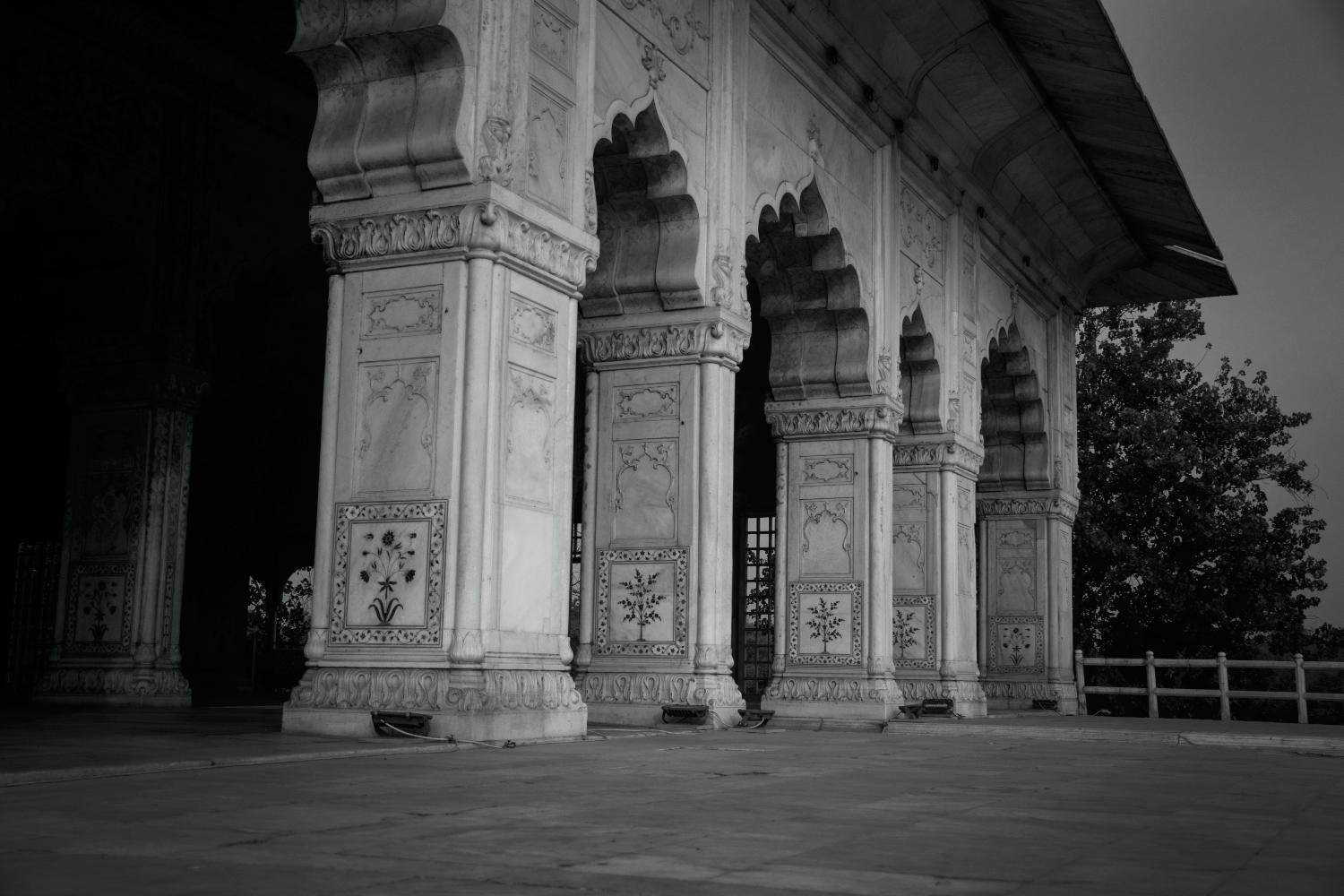
“‘It is by no means true that in all the places where the resurrection of the ‘dead’ is written, death has been mentioned in its literal or true sense; rather, according to the lexicon, the meaning of death is also sleep as well as all kinds of unconsciousness. So, why should we intentionally create any contradiction among the Quranic verses? In hypothetical terms, even if the four animals came back to life after
“‘One cannot raise the allegation that Muslims also declared human souls to be eternal, because the Holy Quran does not teach that human souls are innately eternal, it rather teaches that this eternity is only a Divine gift for the human soul, otherwise, the human soul is also perishable like the souls of animals.’” ( Naseem-e-Da‘wat , Ruhani Khazain, Vol. 19, p. 382, footnote)
“Thus, in my view, there is no contradiction between the sayings of the Promised Messiah as and what I said during the Waqf-e-Nau class. If it was not clear before, it should be clear now that the matter of animals is limited only to their mutual dealings being redressed. The commandments of the sharia will not be applied to them, nor will they have anything to do with that Judgement. On the other hand, humans will be dealt with in view of the commands of sharia and their reward will be decided according to their actions and the extent to which they followed the dictates of sharia.”
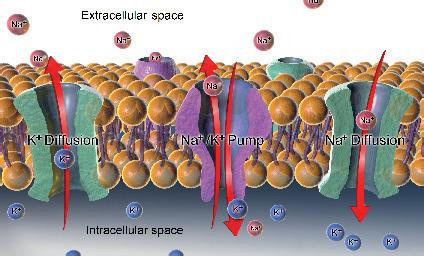
Someone from Germany sent his interpretation of the following verses of the Holy Quran to Hazrat Amirul Momineen, Khalifatul Masih V :
“That is fine as your personal interpretation and one aspect of these verses may well be what you have described. However, to confine the interpretation of these verses to only this aspect would be tantamount to limiting the broad scope of the Holy Quran’s message. This is because there are many other aspects of these Quranic verses that have been explained by the classical commentators in their respective times. Moreover, the Promised Messiah as and his successors have also explained many new aspects of these verses, which can be read in their tafasir and other writings.
“For example, seawater is very salty, but when that water condenses into clouds and falls back to the ground as precipitation, it is very sweet. And there is a ‘ barrier’ between these two types of water that never allows [the seawater] to remain the same.
“Likewise, it can seemingly also be
[And He it is Who has caused the two seas to flow, this palatable (and) sweet, and that saltish (and) bitter; and between
interpreted as the waters of seas and rivers. Seawater is salty, while water from rivers is usually sweet.
“Then, it can also refer to the spiritual teaching, which is like sweet water and the teaching of disbelief, which is like salty water, i.e., the teachings that come directly from God are sweet and the teachings that, although they have existed in the world for a long time, are not based on direct revelation, are bitter.
“Similarly, many interpretations of ‘the creation of man and every living thing from water’ have been given by the Promised Messiah as and his Khulafa. Among them is that every living thing is sustained by water. Hence, when rain falls from the sky, crops grow on the earth, which sustains life. In the same way, it is
necessary for spiritual life that spiritual water keeps descending from the heavens. Likewise, in the reservoirs of fresh and saltwater, i.e. the seas and rivers, Allah the Exalted has created food for humans and other animals in the form of different types of fish and aquatic creatures.
“Therefore, it is not correct to limit the wide scope of themes described in these Quranic verses to only one aspect. Yes, it is permissible to derive different meanings from them that are in accordance with the Holy Quran and the teachings of the Holy Prophet sa, as well as the interpretations of his ardent devotee, the Promised Messiah as, the Hakam and ‘Adl of the age.”

Someone from Germany sent a copy of the letter he had written to Nazim Darul-Qaza Germany, to Hazrat Amirul Momineen, Khalifatul Masih Vaa. In that letter, he requested guidance regarding the validity of the divorce [talaq ] he had issued but had a sexual intercourse with his wife during the ‘iddah period and had then lied to Dar-ul-Qaza about it. He asked whether, in view of these circumstances, the confirmation letter from Dar-ul-Qaza regarding his talaq was valid, or whether he had to repeat the entire process [if he still wanted a divorce].


Huzoor-e-Anwaraa, in his letter dated 29 October 2021, gave the following reply to this question:
“Based on the circumstances you have described, your talaq, during the ‘iddah period of which a conjugal relationship was established between you and your wife, was not effective. Thus, the verdict of talaq that has been passed by Dar-ul-Qaza with regard to you and your wife is not valid. This is so because you misrepresented the truth before Dar-ul-Qaza.
“Nevertheless, you have used one out of the three opportunities for talaq given to the husband by Islam. Moreover, since a conjugal relationship was established between you and your wife during the ‘iddah period after that talaq, this act would be considered your ruju‘ from talaq i.e. reconciliation.
“Now, if you wish to divorce your wife again, it would be considered the second pronouncement of talaq on your part. The ‘iddah period after it will be three menstrual cycles, or if she does not menstruate, then it will be a period of three months. Moreover, if your wife is pregnant, the ‘iddah period will last until the delivery.
“After this period of ‘iddah, provided that you do not reconcile [ruju‘] with your wife, the divorce between you and your wife will become effective.
“May Allah the Exalted have mercy on you and grant you both, husband and wife, the ability to follow all the commandments of Islam, while keeping in mind truthfulness and the fear of God.
Amin.”

(Compiled by Zaheer Ahmad Khan, Head of Records Department, Private Secretariat, London. Translated by Al Hakam.)

Jamaat-e-Ahmadiyya Kenya held its 55th Jalsa Salana at the Jamaat headquarters in Nairobi from 10 to 11 December 2022. The theme for this year’s Jalsa was “Service to Religion is a Blessing from God.”
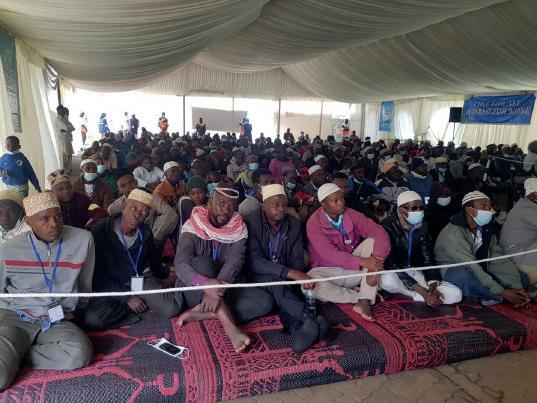
After the flag hoisting by Amir Jamaate-Ahmadiyya Kenya, Tariq Mahmood Zafar Sahib, the Jalsa Salana commenced at 10am with the recitation from the Holy Quran and a poem. The highlight of the Jalsa was the faith-inspiring message from Hazrat Khalifatul Masih Vaa. The following message was read to members by Amir Jamaat Kenya.
“Dear members of the Ahmadiyya Muslim Jamaat Kenya, “Assalaam aleikum warahmatullahi wabarakatuh.
“I am very pleased that you are holding your Annual Jalsa Salana on 10th and 11th December 2022. It is my prayer, may Allah bless your Jalsa with great success and may all of you receive countless spiritual benefits and gain innumerable blessings by participating in this unique and special holy gathering.
“Every Ahmadi Muslim knows that our Jalsa Salana, in whichever country it is held –and for which you have gathered once again in Kenya – is not a place for materialistic gains or recreation. Rather, our aim is to partake of its spiritual atmosphere and to strive for the sake of our moral reformation. We should endeavour to learn much more about the wonderful religion we believe in – that is, Islam – and try to appreciate the finer points of our faith, and seek to act upon its beautiful teachings by fulfilling not only the rights of Allah but also the rights of mankind. The Promised Messiahas has said:
“‘The key purpose of this convention is to enable every sincere individual, to personally experience religious benefit, to broaden their knowledge and to deepen their understanding of Allah the Almighty, by the grace and opportunity given by Him.
Apart from this, the other benefits are to have an escalation of acquaintanceship among all brothers and this will strengthen the loving relationship within the community….’ (Ishtihar 27 December 1892, Majmua-e-Ishtiharat, Volume 1, Page 360, Edition 2019)
“So, you should listen carefully to the speeches of various scholars of the Jama’at. Remember that the speakers put in a lot of hard work in preparing their discourses – so it is important to listen to them attentively. It is Allah’s sheer Grace upon us that our scholars do research and base their presentations not only on the word of Allah which is the Holy Qur’an, and the Hadith and Sunna of the Holy Prophet Muhammadsa, but also on the enlightened expositions of the Promised Messiahas, and convey that wisdom and knowledge to us.
“Therefore, your sole reason for attending the Jalsa should be for the purpose of becoming better Ahmadi Muslims, bringing about an extraordinary spiritual change within yourselves and striving to form a personal relationship with Allah Almighty, our Creator. In this regard, the Promised Messiahas has stated:
“‘The very purpose for which God Almighty has established this community is for the true comprehension of God, which has vanished from this world and for true righteousness and purity, which is no longer found in this day and age, to be established once again.’ (Malfuzat, Vol. 7, pp. 277-278)
“You must also try to fully realise the importance of the divine institution of Khilafat-e Ahmadiyya which is the source of countless blessings. You should form a deep and personal bond with Khalifatul Masih and always remain loyal. Keep in mind that the solution to the problems of the world and indeed, the attainment of international peace can only be achieved
by adhering to the system of Khilafat. In this regard, I advise every Ahmadi to watch MTA often and benefit from it. In particular, you should listen regularly to my Friday sermons and addresses on other events and occasions. Remember, MTA is certainly an ideal platform that links all Ahmadis directly with Khilafat.
“Preaching is essential for every Ahmadi Muslim so you should remain active in your Tabligh efforts and be always exploring new ways and means of conveying the message of Islam Ahmadiyyat to the people not only of Kenya, or the African continent, but indeed the whole world.
“May Allah enable the participants of your Jalsa Salana to fulfil its aims and objectives, and may He enable you to achieve a genuine transformation in your lives towards more piety, good behaviour and the dedicated service of Islam and humanity. May Allah enable you all.”
Four speeches were delivered on the first day. Sheikh Abdallah Hussein Juma Sahib spoke on “Blessings of Khilafat”, and enumerated some of the blessings attained by Jamaat during the period of Khilafat, how Allah the Almighty blessed the institution and made sure that Jamaat – despite challenges from the enemies and adversaries –was able to pass through by the sheer mercy of Allah.
After some announcements, the members offered Zuhr and Asr prayers.
The second speech was delivered by Sheikh Yusuf Obatt Sahib, on “The Holy Prophetsa is the Best Example for the Whole of Mankind”. He elucidated incidences of the blessed character during the life of Holy Prophetsa
The third speech was about the advent of the Promised Messiahas, by Sheikh Basharat Malik Sahib.
The last speech of the first day was de-
livered on “The Best Ways to Use Social Media”, by Sheikh Muhammad Adnan Hashmi Sahib.
After Maghrib and Isha prayers and dinner, members converged in the Jalsa Gah for a question and answer session. In this session, answers were given to questions asked by members on different topics. It was an interactive session that proved to be fruitful. This marked the end of the first day.
The second day started off with Tahajjud, Fajr and dars-e-hadith. Five speeches were delivered in two different sessions.
The first speech was on “Nizam-eJamaat”, by Sheikh Nasir Mehmood Tahir Sahib.
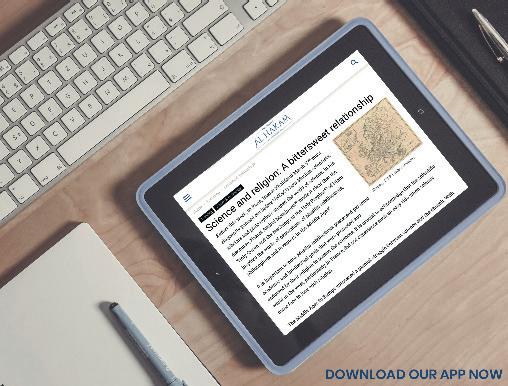
The second speech was about the blessings of financial sacrifices, delivered by my humble self, Secretary Ishaat Jamaat Kenya.
The third speech was on “The Truth of the Promised Messiahas”, by Sheikh Sadam Rajab Sahib.
The fourth speech was presented by Sheikh Faheem Ahmad Lakhan Sahib on “The Holy Prophetsa: the Best Example”.
Another speech was delivered by Sheikh Muhammad Afzal Zafar Sahib on “Service to Religion is a Blessing from God”.
Thereafter, Amir and missionary-incharge Jamaat Kenya, Tariq Mahmood Zafar Sahib gave the concluding address. He urged the members who were in attendance to step up and do what is required of them as Ahmadis. He said that we should sacrifice not only in terms of wealth, but also in terms of time to come and help the Jamaat of the Promised Messiahas
Alhamdulillah, for the first time, this year’s Jalsa was live streamed via Jamaat Kenya’s official YouTube channel and members who, for various reasons, could not come to Jalsa were able to virtually follow the proceedings.
they are only required to contest the people of other religions in the field of tabligh [preaching the message of Islam].
“It is tabligh through which Islam would spread around the world. The Muslims can conquer the world only through tabligh. But alas, the Muslims have forgotten this tool, which is a means for their victory. This is the future [for the Muslims] which has been presented by Hazrat Mirza Sahibas, and I firmly believe that this is the means through which Islam can become victorious in the world.” (Ibid, p. 9)
The speech was highly commended by the non-Ahmadi attendees, who acknowledged that Huzoorra had presented the Jamaat’s point of view in a very nice way.
The next day, the then na’ib amir of Jamaat-e-Ahmadiyya Quetta, Sheikh Karim Bakhsh Sahibra wrote to Huzoorra:
Hazrat Musleh-e-Maud, Mirza Bashiruddin Mahmud Ahmadra delivered a lecture at a tea party held in his honour on 1 August 1950, at the York House in Quetta, Pakistan. In addition to the local Ahmadis, the event was also attended by around 325 nonAhmadi dignitaries.
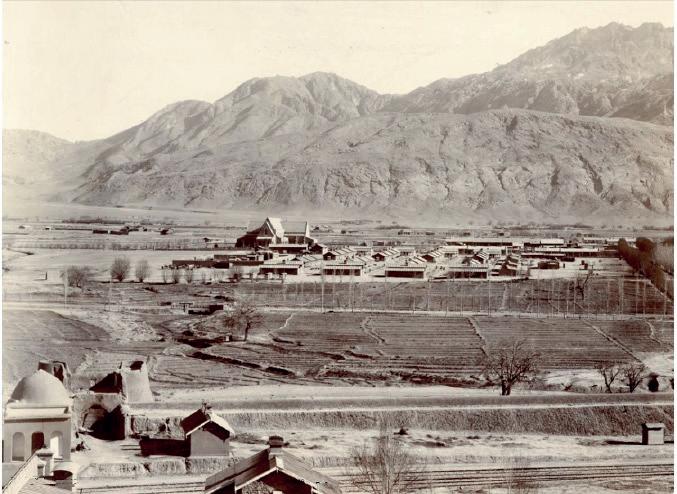
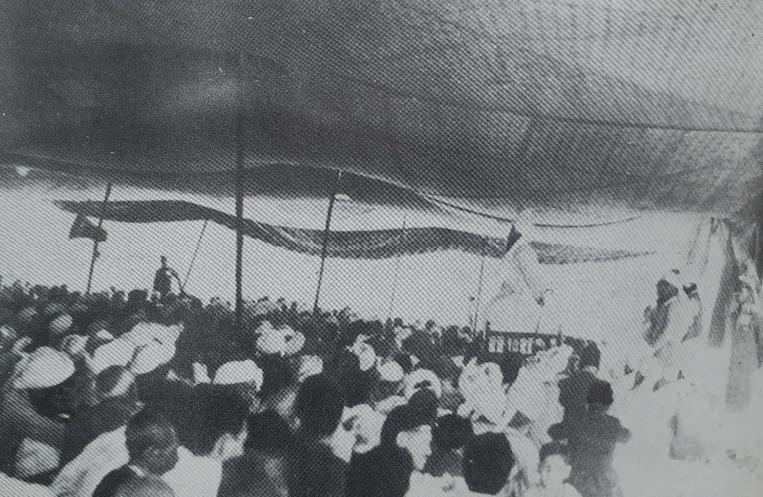
Following his lecture, Huzoorra was requested to answer some questions in regard to the beliefs of the Ahmadiyya Muslim Community.
While responding to a question as to what kind of future Ahmadiyyat presented for the Muslims, Huzoorra said:
“In my view, the question has not been phrased correctly. Since Ahmadiyyat is not a new religion, it is not required to formulate any new programme. Ahmadiyyat is, in fact, the continuation of Islam’s progress. [...]
“Therefore, the question should be as to what pathway Islam has presented for the Muslims of this era, for whose fulfilment Ahmadiyyat has been established.” (Al Rahmat of Lahore, 14 August 1950, p. 8)
Huzoorra continued by saying that God Almighty and the Holy Prophet Muhammadsa had taught a pathway for the Muslims, and Hazrat Mirza Ghulam Ahmad Sahibas, the Promised Messiah, was their na’ib [vicegerent and subordinate]. The Promised Messiahas and his Jamaat had been given the responsibility to continue the mission of the Holy Prophetsa Huzoorra then mentioned the following
“‘And, our Lord, raise up among them a Messenger from among themselves, who may recite to them Thy Signs and teach them the Book and Wisdom and may purify them; surely, Thou art the Mighty, the Wise.’” (Surah al-Baqarah, Ch. 2: V. 130)
Commenting on this, Huzoorra said that the Holy Prophet Muhammadsa had been given the task to recite the Signs, teach the Book and Wisdom, to purify the souls and propagate Islam. Though the fundamentals of the Holy Prophet’ssa teachings would always remain the same, their details would change according to different ages.
Huzoorra further said that as long as the Muslims followed the true teachings of the Holy Prophetsa, they were achieving great success, even in terms of worldly progress. However, when they abandoned those teachings, they were bound to face worldly regression as well:
“Now, the mission of the ma’mur [God’s appointed one] of this age is to once again recite the Signs, teach the Book and Wisdom, purify the souls, and to formulate a scheme for the progress of Islam. Therefore, he [the Promised Messiahas] did recite the Signs, teach the Book and Wisdom, and his Jamaat is now continuing his mission.” (Al Rahmat of Lahore, 14 August 1950, p. 8)
Huzoorra continued:
“Nations always progress through ideas. Hazrat Mirza [Ghulam Ahmad] Sahibas has
taught such ideas to the Muslims, which would enable them to progress. For instance, Hazrat Mirza Sahibas has presented the following outstanding principles, which would enable the Muslims to protect themselves from the opponents’ spiritual attacks […]:
“1) No part of the Holy Quran is abrogated.
“2) The Holy Quran holds a great order in it.
“3) The door for divine revelation is always open.
“4) A Muslim can attain many high stations, in obedience and submission to the Holy Prophetsa
“5) All prophets are honourable, particularly the Holy Prophetsa was the most honourable, and all objections which are raised against him by the opponents, are false.
“6) The Messiah [Jesusas] has passed away.
“7) It is a mistake to attribute divinity to the Messiah [Jesusas]. Allah the Almighty never manifests a Sign that goes against His own attributes.” (Ibid, pp. 8-9)
After shedding light on these principles in detail, Huzoorra said: “According to the needs of this age, Hazrat Mirza Sahibas had taught that the Muslims had the right to make efforts to protect themselves; however, since there is no religious war against them,
“Huzoor’s speech of yesterday had a very good impact on the public, and I have heard from many non-Ahmadis that, ‘Today we have truly come to know [about the teachings of] Ahmadiyyat.’ A non-Ahmadi guest, Sheikh Abdur Rahman Sahib had expressed during the jalsa that ‘Hazrat Sahib is a very intelligent and scholarly person’, and that there had been a positive impact on him, by the grace of God. Though there were many staunch Shia, Sunni, and Ahl-eHadith among the audience, they listened to Huzoor’s lecture with great interest.” (Tarikh-e-Ahmadiyyat, Vol. 13, p. 133)
Lieutenant Syed Ahmad Shuja Zaidi Faridabadi expressed, “I really enjoyed this lecture.” (Ibid)
Mr Ghulam Ahmad Munshi, a civilian officer, said:
“After listening to this lecture, I do not agree with those who oppose and abuse Jamaat-e-Ahmadiyya just because of their [religious] animosity. The lecture was very nice, and I liked it a lot.” (Ibid, p. 134)
Another civilian officer, Mr Muhammad Sadiq Sahib Paracha, expressed:
“The lecture was very nice. There is no doubt that in terms of organisation, your Jamaat is the best amongst the Muslims.” (Ibid)
Ata-ul-Haye Nasir Al HakamAs usual, this year [1923] too, the Khalifatul Masih II[ra], Head of the Ahmadiyya Community, invited the Ahmadiyya anjumans to send their delegates to Qadian, for the discussion of certain important matters, and a large number of representatives of the Ahmadiyya anjumans of Bengal, Behar, Madras, Bombay [now Mumbai], UP and the Punjab assembled at Qadian for this purpose during the Easter holidays. The proceedings began on 31 March [1922] when the Khalifatul Masih[ra], the Imam of the Ahmadiyya Community, delivered his opening address and then three sub-committees were formed in order to suggest a practical scheme of work with regard to the three different sets of questions before the meeting.
The sub-committees began their work after noon and finished it by 9pm. The following day, the secretaries to His Holiness, the Head of the Ahmadiyya Community, read their reports of the work done by the different departments and the representatives were given an opportunity to criticise the work done during the year, so that if there be any defect either in the work done by the secretaries or in the method adopted by them, it may be brought to the notice of the Leader.
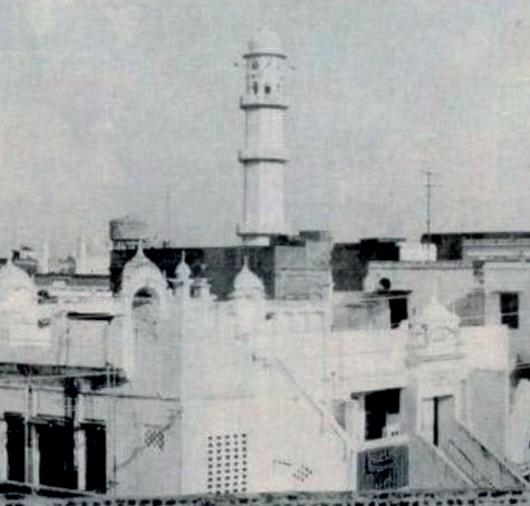
This being done, the reports of the sub-committees were laid before the meeting. The first report that came before the conference was by the president of the sub-committee formed for propaganda [tabligh] work, Mirza Bashir Ahmad Sahib[ra] MA, son of Hazrat Mirza Ghulam Ahmad[as], the Founder of the Ahmadiyya Movement, and it was read by Chaudhry Zafrullah Khan Sahib[ra] BA, LLB, Barat-Law, himself a member of the subcommittee owing to the former’s illness. Besides many important matters on which the sub-committee had submitted a scheme of work, there was one with regard to the proselytising propaganda set up in UP by the Arya Smajists among the Malkana Rajputs. There was a difference of opinion in the sub-committee; some were of the opinion that the time had arrived when the Head of the Ahmadiyya Community should make it obligatory for all members of the community to preach Islam and take part in the propaganda, while others said that as men were forthcoming for the work without any such order from the Leader, there was no need to adopt the abovementioned course.
The matter being discussed threadbare
in the conference the Leader declared that he was also with the majority and that he too considered that at present only an appeal should be made so that those who could afford to preach Islam at their own expense at least for three months should come forward. The Leader, after hearing the opinions of the representatives, also decided that now they should begin the preaching of Islam among the Hindus so that this nation too may very soon receive the light of Islam.
Next came the report of the subcommittees on education. Among the important suggestions made by the sub-committee, there was one that laid out a course of education that should be completed by each and every Ahmadi lady in the ensuing year. After consultation, the Leader of the Ahmadiyya Community, agreeing with the minority, decided that in the ensuing year each Ahmadi lady should at least receive full instructions in the Holy Kalima of Islam and the Islamic prayers. Besides this, agreeing with the majority, he ruled that female education should be made compulsory for the Community and wherever there did not already exist Ahmadiyya schools for girls, new Ahmadiyya schools might be started and where the starting of the school was not practicable, Ahmadi girls should be educated in the Government Girls’ Schools up to the 3rd standard of the primary schools compulsorily and that after this stage had been reached choice might be given to the individuals to pursue any course that they thought best to follow according to their particular circumstances and that where there were no Government Girls’ Schools, girls should be educated at home. For women, it was also decided that after the pattern of للہا ءماا ہ�� (‘Ladies’ Society of the Servants of God’, that has been started under the patronage of the Leader of Ahmadiyya Community for the education and instruction of women at Qadian), Ahmadiyya Ladies’ clubs [associations] should at present be started
at Lahore, Ferozepur, Ludhiana, Delhi, Sialkot and Nowshera Cantt. The duty of these clubs would be to teach women to make use of the education they have received so far, encourage them to invite lectures on necessary branches of learning, from experts and last but not least to have such social [interaction] with the widows, orphans and the poor as may drive away from their minds their feelings of inferiority and helplessness.
Then came the report of the subcommittee on finance. Among other matters on which the committee reported, there was the question of collecting funds to meet the expenses of the propaganda and putting a stop to the apostasy movement. The Leader of the Ahmadiyya Community after listening to the opinions of the representatives on the report of the subcommittee and agreeing with the majority, decided that 50,000 rupees should be collected from among those members of the community who could subscribe at least 100 rupees, and that a general appeal for funds should not be made at present. As soon as this decision of the Leader was made known
to the representatives, they announced their own subscriptions and 10,500 rupees were promised then and there. The members of the Ahmadiyya Community at Qadian had, under the above principle, already paid 4,000 rupees. So, the collected funds came to 15,000 rupees and for the remaining sum, appeals will be made to other members of the community who were not present at that moment. Though Ahmadiyya ladies had already advanced their subscriptions towards the Berlin Mosque funds, those of them who had come to attend the proceedings of the committee and were present there behind the purdah, contributed their quota to this fund also.
The proceedings were concluded with prayer.
Rahim Bakhsh, Private Secretary to His Holiness the Head of the Ahmadiyya Community.
(Transcribed by Al Hakam from the original in The Review of Religions [English], January, February and March 1923)
Hazrat Rahim Bakhsh [Maulana Abdur Rahim Dardra] (1894-1955)This is the divine promise made to Hazrat Mirza Ghulam Ahmadas of Qadian. We can observe evidence for the fulfilment of this promise in our daily lives through MTA, numerous publications, missionary endeavours, and regular Ahmadi Muslims participating in preaching, etc. However, this promise took effect from the moment it was revealed and as a result, we occasionally come across reminders of our past and the extent to which this message was spread. The ARC has discovered published works in English from the time of the Promised Messiahas, including long forgotten images of past companions and countless mentions of the Community in historical papers and publications.
One such piece was found in a book from 1925 titled Hyde Park: Its Orators and Audiences by Donald Stewart. In an effort to continue this historical theme, we present a book review from almost 100 years ago just to give some insight into our latest find.
“Hyde Park: Its Orators and Audiences
By Donald Stewart Elsom and Co., Hull, 1925, pp. 32.
“This pamphlet is a lively description of the speakers at Hyde Park, and their audiences. Various speeches and arguments are summarized, and specimens of the heckling reproduced. Mr. Stewart takes advantage of the opportunity to insert a socialistic speech of his own. His study of Hyde Park does not seem to have given him a style that would command the attention of an out-of-doors audience. E. L. HUNT, Swarthmore College.”(Dolman J, Travis LE, Cable WA, Hudson HH, Hunt EL. 1927. New books. Quarterly Journal of Speech 13[1]. p. 85)
Now that we have some basic idea of what book we are dealing with, let us now turn to the obvious question: What does that have to do with the Ahmadiyya Muslim Jamaat?
To answer the question, we have the testimony of someone who was a regular speaker at Hyde Park, Hazrat Maulvi Abdur Rahim Nayyarra. He was one of the community’s pioneer missionaries, having served in Sierra Leone, Nigeria, Ghana and England. During this time he would write reports back to the headquarters in Qadian, India. Reports like these would come from missionaries all over the world and later get published in Al-Fazl, the community’s newspaper at the time.
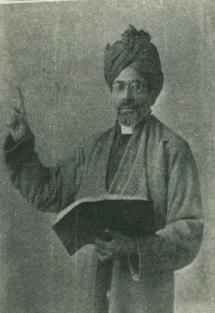
“London: There is a red leather book on the table in front of me. This is written by an English gentleman, who is a clever friend of ours named Mr James Stewart. I can imagine him standing with his book. I am familiar with his face. I am aware of his way of speaking. I remember his questions being filled with criticism. In the days when London’s most skilled speakers were standing near Marble Arch, Hyde Park, trying to influence the local and foreign visitors coming for trade or travel with their own point of view, in the capital city of Great Britain. In those days, our friend would take pen and paper and write summaries of the speakers’ speeches. The name of this book is Hyde Park Orators and Audiences
“In this, the representatives of the Ahmadiyya community and the Ahmadi speaker, wearing a green turban, are specifically mentioned. Mr Stewart writes: ‘Who is this man in the green turban, reading eloquent words in a foreign language? And around him, people have gathered attentively from there and here. Our friend is Indian. The melodious foreign language speech has ended. Now he is starting to express his religion in proper English.’ After this, he summarises my speech and provides some questions and answers.
given the knowledge of Islam and Ahmadiyyat through me. [...] All praise is due to Allah.
“Along with this blue book, we have the reports of our missionaries in London. In the world’s largest city and the centre of Christianity, they are successfully fulfilling their duty of preaching Islam through lectures, sermons, writing, and meetings. The Ahmadiyya London Mosque, near Wimbledon Common, with its white dome, within its apple, pear and plum trees, is shining proof of Ahmadiyya under London’s dark sky. After the completion and opening of the mosque, the first imam will be Maulvi Abdur Rahim Dard Sahibra. And Sheikh Fareed Sahibra will recite the first call to prayer, voicing aloud ‘Allahu Akbar’. And Nayyar is grateful, knowing that the foundation of this mosque was laid by the hands of Khalifatul Masih [IIra] and during my service in London. And the current imam is its namesake. And the Ahmadiyya Community is rightfully blessed for its prayers, efforts, and sacrifices, as a result of which, its members have become the practical example of: یرہما ںاذا نجیگو مین ںو�داو کی بمغر [Through the valleys of the West, our call echoes]. لكذ علیٰ للها لحمدفا [Surely, all praise is due to Allah].” (Al Fazl, 14 May 1926, pp. 1-2)
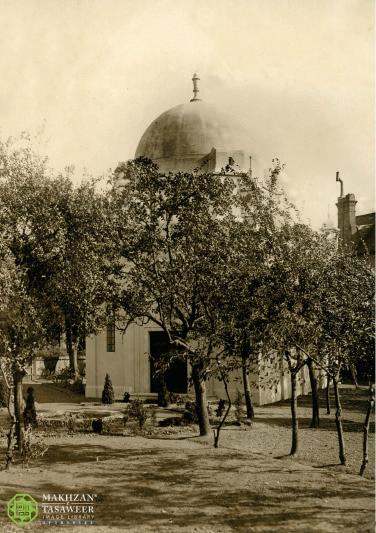
Truly, all praise is due to Allah, and it is through His blessings that we are able to locate this book and bear witness to how He upholds the promise made to His prophet.
the period of Martin Luther and Bluff King Hal, even to the time when the Twelve, on the way to Capernaum, had disputed among themselves who should be the greatest. But fate has settled the question: the Gordian knot is cut.
“Who is this somewhat picturesque individual who, by chanting in some foreign tongue a kind of incantation, is already attracting an audience? An Indian, apparently. Let us go and listen to him. It is but common courtesy to a stranger within our gates. The droning has now ceased, and he begins to speak in good English, and in a businesslike way!
“This book brings back memories of those days. When I used to be so exhausted after speaking for hours, I would find it difficult to even rest. And seeing how people would ignore me, made me so anxious and sad that sometimes, my despair would show itself from afar in a scary form, which I used to suppress by showing the utmost faith. However, now this book will be read by the followers of every religion and community. And they will surely be
“Now that we have arrived, and have conducted a general survey, scrutinised the faces of the orators, and read the inscriptions on the signs and banners, the question arises: to which crowd shall we attach ourselves for a little while, and to which speaker shall we give priority? I suppose if we are to act on the democratic principle, that as the propagators of Christianity are in the majority, compared with those who are expounding political and social ideas, it should be one of the former. But which shall we choose? They are so many; and, rightly or wrongly, there still continue to be divisions amongst them. A state of affairs by no means new, going back as it does far beyond
“Without wasting time, he informs us that his purpose is to explain the precepts and principles of the Mohammedan [Islamic] religion. There are, He says, three great religions closely related to one another –these being, those of the Jews, the Christians, and the Mohammedans [Muslims]. But they are divided in their opinions regarding Jesus Christ. The Jews claim that he was an impostor; the Christians say he was the Son of God; while Mohammed[sa] said he was merely a prophet. Mohammed[sa], who praised him, said that Jesus did not die on the cross, but merely swooned. His legs were not broken. Although placed in the tomb by Joseph of Arimathea, Jesus was taken from there by the Essenes – the brotherhood of monks to which he belonged, and after recovering went out to the East, finally being buried in the valley of Kashmir. In
“I shall cause thy message to reach the corners of the earth.”
Students from Cross Primary and Infant School in Clarendon visited the Mahdi Mosque, in Jamaica, on 2 December 2022.
Before starting our presentations, we requested the guests to remove their shoes prior to entering the mosque. Children are always astounded when we ask them to remove their shoes to enter the prayer hall, but as soon as we demonstrate how we offer salat, they immediately understand.
The local missionary Tariq Azeem Sahib and a missionary from Guyana, Fahd Peerzada Sahib, started their presentation by teaching the students the Islamic greeting of “as-salamu ‘alaikum”. This is always a good start to the presentation to break the ice. It makes the kids smile and it warms the atmosphere for all attendees.
The presenters taught the basics of Islam, including how Muslims worship Allah the Almighty, by demonstrating the Islamic prayer.
The kids were engaged and asked plenty of questions. They were particularly curious to learn about women’s rights in Islam.
For this purpose, my humble self had the opportunity to explain my modest dress and my hijab. Upon explaining, the children as well as the staff accompanying them, greatly appreciated the message as it seemed to resonate with them.
We ended the 45-minute presentation and distributed some sweets, which we always have handy at the office for children.
On the same day, students from Comfort Hall Primary School from the parish of Manchester, visited the Mahdi Mosque. Our local mu’allim, Ghulam Ahmad Sahib, welcomed the guests and gave them a tour of the mosque with the help of another volunteer. He also taught them the basic Islamic values and our fundamental teachings and he ended his presentation by handing out sweets.
Teachers from both schools were extremely pleased with their visits and thanked us for arranging the tour on short notice. They also expressed the desire to have future visits to the mosque. One of the schools scheduled a visit for the following week with a different batch.

Kashmir, the people are very similar both in features and manners to the Israelites. Even the names of the towns are the same.
“Mohammedans believe there is a certain amount of good in all religions, although they also contain some errors. Christianity had departed from its early purity and simplicity. Mohammedans did not believe in the Trinity, but in one GodAllah. Just as Jesus came after Moses as a prophet, so did Mohammed[sa] come after Jesus. God sent prophets at various times and places. Mohammed[sa] taught (1) that there is only one God, (2) the practice of prayer, (3) fasting, (4) self-sacrifice, (5) pilgrimage to Mecca and the doing of good. There are no dogmas or mysteries in their religion – no pictures, crosses or crucifixes.
“It appears that the Mohammedans are not in entire agreement amongst themselves, for the speaker says that he is not an orthodox Moslem. While the latter believes that the Messiah is still to come, he believes that Ahmad, the founder of the Ahmadia Movement, who died in the year 1908, was the promised Mahdi and Messiah.
“Our Oriental friend, having stated his case, is now prepared to answer questions and refute all calumnies regarding his beliefs.
“Upon being asked if it is not a fact that Mohammedans refuse to accept the Jew as a friend, he describes events that took place in the life of the Prophet[sa] that proved that the latter was an exceptionally good friend of the Jew. As for persecution, says

he, we ruled in Spain for seven hundred years, where we had our observatories and our universities, and the Jews had free worship. When the Christians drove the Moors out of Spain, the persecution of the Jews began. When the Roman priests came to the observatories, they found implements there, and saying, ‘Devil, Devil,’ had them destroyed. Those who had read Sir Walter Scott›s novel “Ivanhoe» would remember that when the Jews were driven out of England, Rebecca had said that she would go for safety to Spain, which was then under Moorish rule, and was the only country in Europe that gave freedom to the Jews.

“‘But what of the massacre of the Armenians by the Turks?’ he is asked.
“It is the duty of the Moslems, he answers, to protect all the people who live within their borders; as well as all religious buildings, whether they are churches, temples, synagogues or mosques. When Selim I, Sultan of Turkey, in the 16th century, had conquered Egypt, Syria, and the Hejaz, with Medina and Mecca, he ordered the Christian temples to be destroyed. But Sheikul Islam (the head of the Mohammedan Faith) said: ‘Go, and cancel that order.’
“If Turks persecuted, they did it as individuals. The Turks are condemned if they do anything wrong: but what of the Greeks and Christians generally? Christians of various nationalities had said to him: ‘I would like to kill you.’ Prejudice was to be found everywhere.
“We should cultivate friendship with all, even though we can not agree, can

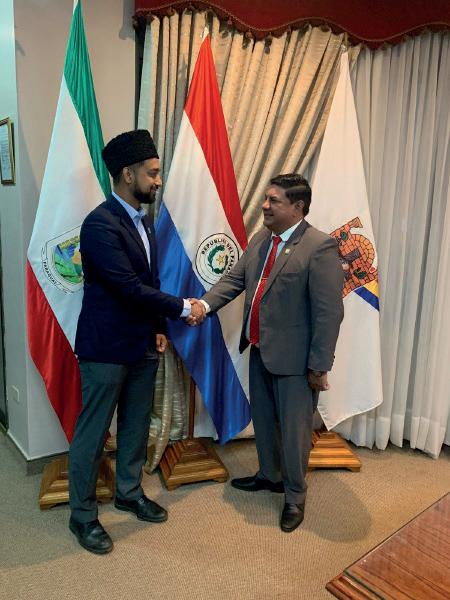 Mishaal Baten Paraguay Correspondent
Mishaal Baten Paraguay Correspondent
On mission work in the region of Itapua –Paraguay, the missionary Abdun Nur Baten Sahib was invited to the state government
offices. He had the opportunity to meet the Governor of Itapua, Mr Christian Brunaga, who gave him a warm welcome. He was introduced to the Ahmadiyya Muslim Jamaat and it was discussed how the Jamaat can help the people of this state. The possibility of building a mosque in the region was brought up and the idea was welcomed by the government.
Last year, the Jamaat had the opportunity to make a donation of personal protective equipment (PPE) to the regional hospital and the government remembered this donation and still showed gratitude for the gesture.
After an exchange of gifts, missionary Abdun Nur Baten Sahib was invited to meet all of the state legislatures. He also met with staff from several government departments, including Culture, Indigenous Services and Disaster Relief. With the Secretary of Culture, it was agreed to plan an interfaith dialogue that would be organised in collaboration with the government and the Jamaat.
not all be of the same faith. If he wanted to go to Oxford Circus, he could go by various routes, but he would choose the best one. The Christians by rejecting Mohammedanism [Islam] were bringing curses on themselves, as the Jews have by rejecting Christ.
“The Moslems did not say that a woman has no soul. They did not believe that she alone brought sin into the world, but man and woman both.
“‘The trouble with the Christians is that they take the language of the Bible literally,’ he replies, in answer to a questioner who quotes Christ›s saying: ‘I am the way, the truth and the life; no man cometh to the Father, but by me!’ When we say that Christ is the Lamb of God, we do not mean that he has four legs or a coat of wool!
“But by this time, our Indian friend, as he turns out to be, is on the ground, having vacated his pedestal. And although a lengthy debate takes place amongst members of the audience as to what Christ really meant by the word ‘way,’ and the phrase ‘but by me,’ which in turn raises the
question as to whether he could have been a God, or the son of God, seeing that on the cross he cried out, ‘My God, why hast thou forsaken me,’ our follower of the Prophet[sa] participates in it for but a short time. He has been fasting for fifteen hours today, and is feeling somewhat weary.” (Hyde Park: Its Orators and Audiences by Donald Stewart, 1925, pp. 5-6)
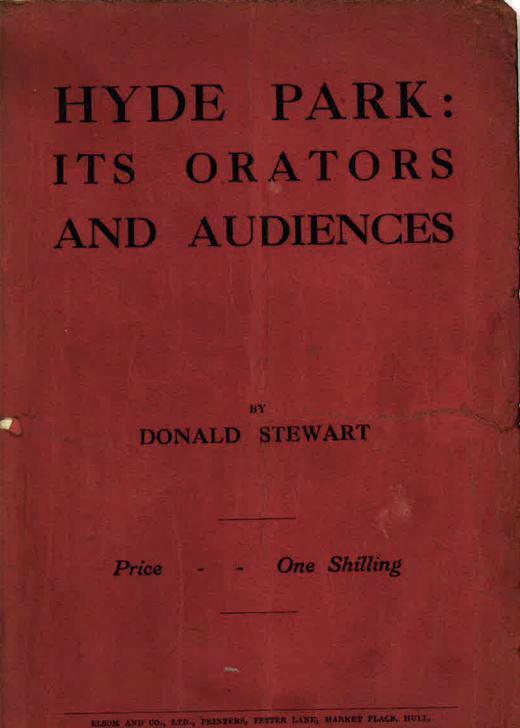
proceeded to the battlefield to defend her beloved Mastersa. Then we see Hazrat Khaulara who set an example on the battlefield, where she displayed great courage and bravery and freed her brother who had been taken hostage by the Roman army.
Thus, segregation in Islam has never meant that women do not take part in pursuits outside the home. Islam’s history testifies that women did.
trained the male members of the Jamaat, how to respectfully, and kindly treat women and how to keep their rights in view. (History Lajna Imaillah, p. 2) The Promised Messiahas taught, “We should treat women with courtesy and kindness.” (Malfuzat, Vol. 1, p. 307) Now, the ladies of the Ahmadiyya Muslim Jamaat continue to develop and flourish under the guidance of Khulafa-eAhmadiyyat.
Attiya Shaukat UKIn Jesus’as time, loyal female helpers such as Mary Magdalene worked tirelessly to spread Jesus’as message. Her contribution has been noted in Christian history as a source of pride, even though she was not one of the twelve disciples.
A far greater number of female
Companionsra were noted as being the Companionsra of the Prophet Muhammadsa
If in sincerity and ardent devotion the male Companionsrq loved the Holy Prophetsa, then so did the female Companionsra. One such lady was Hazrat Umm Ammarahra
When she saw that the Holy Prophetsa was outnumbered during a battle, she immediately picked up a sword and
On 2 December 2022, twelve students from Jamia Ahmadiyya Canada’s Shahid class visited a Latin American radio station in Toronto. This visit was part of the Spanish syllabus of Jamia, to reach out to local communities. It allowed students to enhance their knowledge of Latin American culture – where the Spanish language is predominantly spoken. The students were accompanied by the missionaries, Mahboob Ur Rahman Sahib and Muhammad Saleh Sahib.
The radio station has the name “CHHA La Voz de la Comunidad” and is part of the local San Lorenzo Anglican Church. It was established to provide a safe space for Latin American immigrants and for the preservation of their culture in Canada. Recently, the radio station completed its 18th anniversary.
The visit began with an informative presentation by the radio coordinator at the station, Mr Ron Cha. He gave the background and history of the church and radio station. After that, the students
had an opportunity to ask questions.
After this introductory session, students were given a tour of the property, which consists of three main sections; the radio station, the church and the community centre. During the tour, the students also met many members of the community who work as volunteers and had the opportunity to interact with them and learn from them.
Jamia students returned with a better understanding of Latin American culture, which will aid them in the future, inshaAllah. On behalf of all the students, one Jamia student at the end thanked the host in the Spanish language.
The event host and radio coordinator, Mr Ron ChaWe, wrote a letter of thanks and commented:
“Great conversation and an inspiration to see young people dedicated to making our world a better place to live in community, in harmony, in peace, as brothers and sisters, as our Creator wants. I hope someday we can visit you.”
(Hazrat Khalifatul Masih IVrh, English Mulaqat, 16 June 1996) These women showed that whilst guarding their chastity, they were able to volunteer for the front line. Indeed, these female Companionsra of the Holy Prophetsa were great leaders.
Then, in the era of the Promised Messiahas, women would be required to take on a similar role for their faith. During the Promised Messiahas time, he personally
In various countries of the West, women led by the suffragettes ran an aggressive campaign to be heard. Contrastingly, women in the Ahmadiyya Muslim Jamaat were gently being told to awaken from their slumber and realise their worth. They did not have to “wrangle with men to receive their rights, because those rights had already been given to them by God and nobody can take them away.” (Hazrat Khalifatul Masih Vaa, 24 February 2018, The High Status of Women)
Thus, without any violence of any sort, Lajna Imaillah – the organised female community of the servants of Allah – was initiated by a man who was the Second Khalifa of the Promised Messiahas, Hazrat Mirza Bashiruddin Mahmud Ahmadra

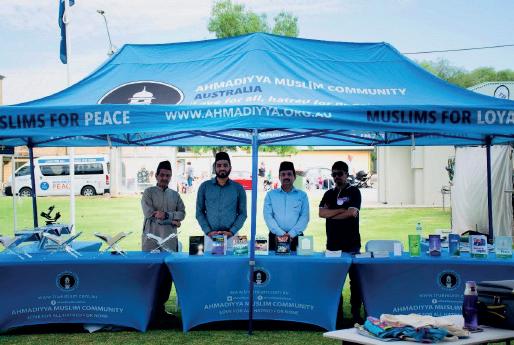 Dr Sharif Rasel Secretary Tabligh Jamaat Adelaide West, Australia
Dr Sharif Rasel Secretary Tabligh Jamaat Adelaide West, Australia
Jamaat-e-Ahmadiyya South Australia made a trip to the Yorke Peninsula on 10 December 2022 to spread the peaceful teachings of Islam. The Jamaat extended friendship to the local community at a Christmas market in the historic town of Moonta. The Moonta and District Progress Association, the organiser of the Christmas market, invited the Jamaat to participate in the market. The Jamaat accepted the invitation to continue reaching out to different remote communities in South Australia.
Due to its copper mines, Moonta was once the second-largest town in South Australia. It is famous for its beautiful iconic buildings, churches and old mining sites, which made it the top tourist destination of the state in 2021. The town is a two-hour drive from the Mahmood Mosque, and the Jamaat
members began the trip after a silent prayer at 12:30pm to participate in the Christmas Market at Moonta for the first time. This was an annual event which ran between 3 to 8pm. Thousands of local community members and tourists visited the market for its wide variety of stalls and other fun activities.
Jamaat-e-Ahmadiyya was given a central location in the market, and thus, the peaceful message on its marquee was visible even from a distance. Besides spreading the peaceful teachings of Islam from the stall, Jamaat members also went out and distributed hundreds of pamphlets on different streets of the town.
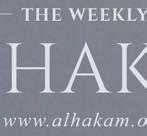 Fazl,
Fazl,
 Hazrat Maulvi Abdur Rahim Nayyarra (1883-1948)
Bauchi Plateau
Hazrat Maulvi Abdur Rahim Nayyarra (1883-1948)
Bauchi Plateau
Zaria is a junction and a railway line has been proposed from here to Sokoto, Bauchi and Chad. At present, one railway line is operational for around 150 miles and this is the Jos Branch. Considering the situation in Africa, we can say that this railway line is the Kalka-Simla Branch of West Africa. Jos is now a town. A group of European contractors has raised it to the status of a town. The city of Bauchi is several hours away from here and the governor of Bauchi lives there. Christian churches are being built in the town of Jos. Missionary delegations of all Christian sects have reached Jos from Zaria. They are starting their work among the hunter-gatherers. The area around the town of Jos is all mountainous and the people there do not wear clothes. They live in caves and bring the provisions of the forest to the city where they get some goods in exchange from the market. In the morning, if you stop for a while in the market of Jos, you will see hundreds of unclothed men and women. You will not see them walking slowly, sitting down, or standing upright. These people move fast with a slight bend in their backs. Cannibalism is still prevalent among them. They do not dare lay hands on strangers for fear of the government. However, if their sick is about to die, they make him part of their body rather than burying him and this is one of the defining aspects of their food. I hope I have the resources to successfully perform the work that I want to carry out. I wish I had even 1/10th of the means, especially monetary assistance, as compared to the Christian missionaries. I have men who can go freely to trade among the hunter-gatherers and also speak their language to a certain degree. If such individuals are sent to the hunter-gatherers of the Jos region after the necessary education and training, Ahmadiyyat can utterly overcome the dominance of Christianity in three years by the grace of God, and the work of enlightening the people there can be done more successfully with less time and money with the blessings of God.
On the morning of 22 August [1922], I was to leave for Zaria. Among those who took bai‘at before my departure, were three gentlemen of the Hausa tribe. One of them was the son of a former chief of Sokoto (who had lost his wealth due to wasteful spending). The other two were from Kano and Katsina. Apart from them, another person pledged allegiance who was from Bauchi. It is as if God has sent
the representatives of the famous nations of the North, i.e., Sokoto, Kano, Katsina and Bauchi. This is a delightful occasion, as it could also be considered an auspicious omen for the future development of the Jamaat. The imam, Dep. imam and a few other youths came to the station to bid me farewell and the train journey was spent preaching to the railway officials, passengers and a fellow British engineer in the first-class carriage. After crossing the Dalacha River, the city of Kano came closer. The scenery of the country began to resemble that of the Punjab. Kano approached, but there were no proper arrangements for the stay. The people of Zaria were told to send a telegram to Kano, but God knows whether it was sent or not. In the middle of these anxious thoughts, I heard a Christian gentleman talking to a Lagosian woman, and when the woman pointed to me, the man said: “Yes, I know Ahmadiyya.”
I thought it was time to let go of the anxiety of the heart, but it turned out that the above statement was merely a simple phrase that came out of his mouth during the conversation. Then I saw a person come from the third class and after politely greeting me, he asked, “Are you going to Kano? We have been waiting for you for a long time.” I thus found what I was eagerly awaiting and told this newcomer to call my secretary, Zakaria who was in the next room. Zakaria came and the two Yorubas greeted and talked to each other. Our new friend gladly promised to make all the
arrangements for our stay. Alhamdulillah, this person is a resident of Lagos and has a great deal of affection for Ahmadis.
Kano station and Sabon Gari
Finally, the last train station arrived and everywhere I looked, I saw Hausas wearing turbans, peculiar clothes and trousers. Hundreds of workers were present at the station. Magnificent buildings were visible. As soon as I got off the train, I stood on one side and dear Zakaria and my new friend Tahami got busy bringing luggage from the guard’s carriage. As I was in a travel outfit and had a British hat on my head because of the sun, the Christians assumed that a Roman Catholic Father had arrived. Consequently, voices of “Good afternoon, Father” were heard. I replied with a smile and gave a short sermon expressing my religion and inviting them to Islam. In the meantime, the luggage arrived and Zakaria gave me an umbrella and a turban. As soon as I put it on, the voices of “Lino, lino, Ya Mu‘allim” and “Sulam, sulam, Maulvi Sahib” were raised by those people. The distance from the train station to the population is about two and a half miles, and near the station are the houses of all the foreign merchants. No rides are available at the station. One of the prominent features of travelling in this country [Nigeria] is that one has to carry almost all the essential items with them. Consequently, as I was walking, I saw a simple porter carrying my belongings. Apart from books, one has to travel with food and sleeping equipment,
i.e., half of the items in the house have to be carried. However, after departing from the station, we arrived in one of the villages of Kano, Sabon Gari (new town). Most of the residents here are Christians, including the people working in the government offices and the employees of the merchants. Yoruba Muslim traders and some Hausa people who do not want to live in the city of the governor are also settled in this place. Our guide and helper, our new friend Tahami, brought us to the house of the Siriki Muslim chieftain.
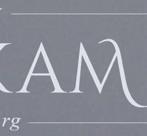
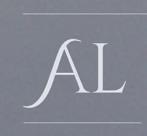
The aforesaid chief was present at his house. When Tahami knocked at his door, he said in the Yoruba language, “Tani ho” which means “Who is it?” Tahami answered in a loud voice, “Ahmadiyya Movement.” I am popularly known by the name “Ahmadiyya Movement” or “Ahmad” in Yorubas. In the meantime, a part of my luggage had been taken into the house of the chief. He came out and met us very warmly and said, “Why didn’t you inform me earlier so that all the people would have gone to the station to receive him?” However, the “Ahmadiyya Movement” thus reached Kano with all of his belongings. […]
Abdur Rahim Nayyar, 10 October 1922.
(Translated by Al Hakam from the original Urdu, published in the 11 December 1922 issue of Al Fazl)
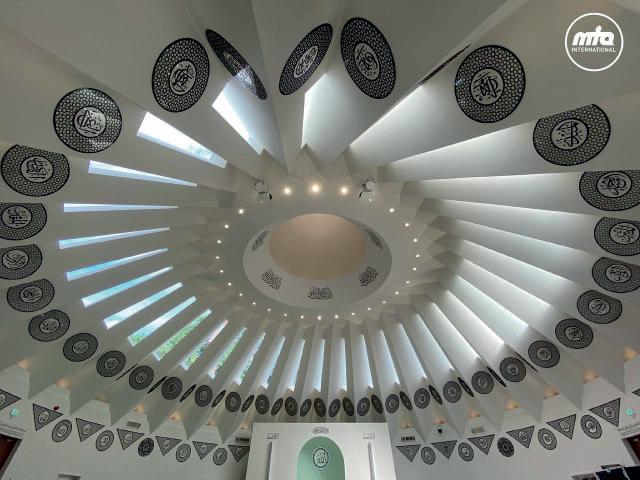
The virtues and qualities of Hazrat Abu Bakrra Siddiq were being mentioned. The following is written in relation to him being the best of people and the most beloved among them.
Hazrat Ibn Umarra relates, “During the life of the Holy Prophetsa, we used to mention people from among us who were better than others.”
They used to draw comparisons to determine who was better than the other. [He says:] “At that time, we used to consider Hazrat Abu Bakrra to be the best [among us]. He was followed by Hazrat Umarra bin Khattab and thereafter came Hazrat Uthmanra bin Affan.” (Sahih al-Bukhari, Kitab Fada’il Ashab al-Nabisa, Bab Fadl Abi Bakrra ba‘d al-Nabisa, Hadith 3655)
Hazrat Jabirra bin Abdillah relates that Hazrat Umarra said to Hazrat Abu Bakrra, “O ye, who is the best among the people after the Holy Prophetsa!” Hazrat Umarra praised Hazrat Abu Bakrra, in response, Hazrat Abu Bakrra said, “If you say so then I have also heard the Holy Prophetsa say that the sun has not dawned on anyone who is better than Umar!” (Sunan at-Tirmidhi, Kitab alManaqib, Bab fi Manaqib Umarra bin alKhattab, Hadith 3684)
In other words, he immediately demonstrated his humility by saying you call me the best, whereas I have also heard the Holy Prophetsa say that you are best.
Abdullah bin Shafiq relates, “I asked Hazrat Aishara, ‘Who among the companions was the most beloved of the Holy Prophetsa?’
She replied, ‘Hazrat Abu Bakrra.’ I said, ‘And then?’ She replied, ‘Hazrat Umarra.’ I asked, ‘After him?’ She replied, ‘Hazrat Ubaidahra bin Jarrah.’ I then asked, ‘And then?’ Following this, she remained silent.” (Sunan at-Tirmidhi, Kitab al-Manaqib, Bab fi Manaqib Abu Bakr al-Siddiqra, Hadith 3657)
Muhammad bin Sirin relates, “I do not consider it possible for a person who criticises (or finds faults in) Hazrat Abu Bakrra and Hazrat Umarra, and yet, he claims to love the Holy Prophetsa.” (Sunan atTirmidhi, Kitab al-Manaqib, Bab fi Manaqib Umarra bin al-Khattab, Hadith 3685)
It means that he claims to love the Holy Prophetsa despite holding such a view. After criticising Hazrat Abu Bakrra and Hazrat
Umarra, this claim of theirs to love the Holy Prophetsa is wrong, as both of them were very dear to the Holy Prophetsa
Hazrat A’idhra bin Amr relates, “Hazrat Salmanra, Hazrat Suhaibra and Hazrat Bilalra were sitting amongst some individuals when Abu Sufyan approached. Upon this, they said ‘by God! The swords of Allah have not yet settled the score with the necks of Allah’s enemies.’ (That is, they have not yet properly taken revenge).”
The narrator says, “Hearing this, Hazrat Abu Bakrra asked, ‘Are you saying this about the prominent chiefs of the Quraish? Abu Sufyan is also from among the chiefs of the Quraish and you are saying that we have not sought revenge from him.’ Following this, Hazrat Abu Bakrra personally went
to the Holy Prophetsa and informed him of this. Upon this, the Holy Prophetsa said that ‘O Abu Bakr! You might have upset those individuals (i.e. Salmanra, Suhaibra and Bilalra). If you have upset them, then remember that you have, in fact, upset your Lord.’ Hearing this, Hazrat Abu Bakrra immediately went to these three individuals and said, ‘My dear brothers, have I offended you (he said this very apologetically)?’ They responded, ‘Our brother, that is not the case. May Allah forgive you.’” (Sahih Muslim, Kitab Fada’il al-Sahabah, Bab Fada’il Salman wa Bilal wa Suhaibra, Hadith 6412)
Nonetheless, this is a testament to the extent of Hazrat Abu Bakr’sra humility. Despite having freed some of them from slavery himself, he approached them seeking forgiveness. Furthermore, he demonstrated an exemplary standard of love and obedience to the Holy Prophetsa The Holy Prophetsa merely said that he may have offended them; he did not instruct him to seek forgiveness from them. However, [Hazrat Abu Bakrra] immediately went to them and sought forgiveness. In the commentary of this narration, it is recorded that this incident took place after the Treaty of Hudaibiyyah, which was formed to cease the fighting with the disbelievers of Mecca. At the time, Abu Sufyan was not a Muslim. Thus, the Muslims at that time contemplated whether they should have killed them before such a time. (Sahih Muslim bi Sharh alNawawi, Vol. 16, p. 96, Muassisat Qurtubah, 1991)
With respect to the memorisation of the Holy Quran, Hazrat Musleh-e-Maudra has presented some aspects in light of the references of Islamic history. He states, “Abu Ubaidahra narrates that the following Muhajir companions of the Holy Prophetsa had committed the Quran to memory: Abu Bakrra, Umarra, Uthmanra, Alira, Talhahra, Sa’dra, Ibn Mas’udra, Hudhaifahra, Salimra, Abu Hurairahra, Abdullah bin Sa’ibra, Abdullah bin Umarra and Abdullah bin Abbasra. And amongst the women, there were Hazrat Aishara, Hazrat Hafsahra and Hazrat Umm Salamahra. Many of the aforementioned people memorised the Holy Quran during the life of the Holy Prophetsa, while others completed their memorisation after his demise.” (Dibachah Tafsir-ul-Quran, Anwarul-Ulum, Vol. 20, pp. 429-430)
With reference to:
نینثا يناث [the second among the two]
There is a narration of Hazrat Abu Bakrra himself. Hazrat Anasra narrates, “Hazrat Abu Bakrra used to say, ‘While I was in the cave, (i.e. whilst Hazrat Abu Bakrra was in the cave along with the Holy Prophetsa), I addressed the Holy Prophetsa and said, “If they (the disbelievers who were standing outside) decide to crouch down and look inside, they would surely see us.” Upon this, the Holy Prophetsa said, “What do you think about the two people, amongst whom the third is Allah?”’” (Sahih al-Bukhari, Kitab Fada’il Ashab al-Nabisa, Bab Manaqib alMuhajirin wa Fadlihim, Hadith 3653)
This is a narration from Bukhari
The Promised Messiahas states:
“Among the excellences and distinguishing virtues of Hazrat Abu Bakr Siddiqra is that he has the special honour of being chosen to accompany the Holy Prophetsa during his journey of migration. Furthermore, he remained by the side of the
Best of Creation – the Holy Prophetsa –during the hardships he faced. From the moment these adversities surfaced, he was made a distinctive companion (in other words, a special friend) of the Holy Prophetsa so that he could form a special bond with the Belovedsa of God. The wisdom behind this is that Allah the Almighty knew full well that Siddiq-e-Akbar was the most courageous and righteous amongst the companions, the most beloved to the Holy Prophetsa and was a brave man. Furthermore, [Allah knew] that he was absolutely absorbed in his love for the Leaderas of the Universe. From the very beginning, he (i.e. Hazrat Abu Bakrra) helped the Holy Prophetsa with his wealth and attended to his important matters. Thus, through him, Allah the Almighty comforted the Holy Prophetsa during times of difficulty and hardship and gave him the name Al-Siddiq, distinguishing him with the companionship of the Prophetsa in both worlds. Allah the Almighty endowed him with the honourable mantle of نینثا يناث – the second among the two] and counted him amongst His most special servants.” (Sirr al-Khilafah [Urdu Translation], Ruhani Khazain, Vol. 8, pp. 338-339)
Non-Muslim authors have also paid homage to Hazrat Abu Bakrra. André Servier, a 20th-century historian from Algeria, has written about Hazrat Abu Bakrra and states:
“He was a man of simple manners and in spite of his unexpected elevation lived in poverty, when he died, he left behind a worn-out garment, a slave, and a camel. A true patriarch, after Madina›s own heart, he had one great quality – energy. He possessed what had given victory to Muhammad and what was lacking in his enemies (What was that trait?); an unshakable conviction. He was the right man in the right place.”
He then writes, “This elderly and pious man remained steadfast upon his belief despite the treachery and rebellion prevalent all around. With his faithful and unwavering resolve, he commenced the mission of Hazrat Muhammadsa anew.” (André Servier, Islam and the Psychology of the Muslim, p. 51)
Moving on, there is a British historian by the name of JJ Saunders. He writes:
“The first Khalifah has always been commemorated by Muslims as a person who was absolutely loyal and an embodiment of honour and grace. Even the most severe of storms and chaos could not shake his firm resolve and determination. His term of leadership was brief, yet the victories yielded in its course were grand. His unrelenting, resolute and steadfast disposition overcame the rampant apostasy and brought the Arab nation under the fold of Islam once more. Furthermore, his determination for the conquest of Syria laid the foundation for the Arabian Empire.” (JJ Saunders, A History of Medieval Islam [London, UK: 2002], p. 45)
Then, there is another English writer by the name of HG Wells. He writes:
“It is said that the true foundation of the Islamic Empire was established more so by Abu Bakr than by Muhammad[sa], to whom Abu Bakr was a friend and helper.” This is an exaggeration on his part. Nonetheless, he further writes, “While Muhammad[sa], despite his unstable position, was the initial brain and visionary behind Islam, (Godforbid) Abu Bakr was its wisdom and determination. Whenever Muhammad[sa]
would waver, Abu Bakr would become his reassurance.” These words are baseless and absurd and devoid of truth. Nonetheless, what he writes onwards is correct. He writes, “When Muhammad[sa] passed away, Abu Bakr became his caliph and successor. With faith more firm than mountains, he very simply yet strategically took on the task of bringing the whole world under the command of Allah, all with a small army of three to four thousand Arabs.” (HG Wells, A Short History of the World, p. 76) Nevertheless, as I have stated, this writer has mentioned some qualities of Hazrat Abu Bakrra that he undoubtedly possessed. However, because these people are not aware of the most high and lofty station of prophethood granted to the Holy Prophetsa, they praise Hazrat Abu Bakrra, Hazrat Umarra and others with great exaggeration and in a manner that is utterly false. Whether it was Hazrat Umarra or Hazrat Abu Bakrra, they were all loyal, perfect followers and lovers of their Master, the Holy Prophet Muhammadsa. These individuals were in no way responsible for Prophet Muhammad’sra wisdom, but in subservience to him, served as his hands and feet. Similarly, the religion of Islam was not the brainchild of the Holy Prophetsa, nor was it a result of his efforts. The author wrote that the Holy Prophetsa was the brain behind Islam, God-forbid. However, Islam truly refers to a complete religion and perfect law derived entirely from divine guidance and revelation. Furthermore, there was no moment of concern or irresolution where Hazrat Abu Bakrra became the reassurance needed by the Holy Prophetsa. In fact, no such moment can be found in his lifetime, where the bravest of mankind, the valiant and courageous Prophetsa became distressed and irresolute. If ever there was a cause for concern, then the Almighty and Everlasting God became his source of solace. The author has written that Abu Bakrra would provide solace to the Holy Prophetsa, however, we have observed that the truth is quite the opposite; whenever something concerning or distressing occurred during Hazrat Abu Bakr’sra life, the Holy Prophetsa comforted him. For instance, at the time of migration, Hazrat Abu Bakrra was very concerned and distressed, and although this concern was out of his love for the Holy Prophetsa, it was the Holy Prophetsa who comforted Hazrat Abu Bakrra and reassured him by saying:
“O Abu Bakr, do not worry. Allah is with us.” As it was mentioned earlier, Hazrat Abu Bakrra has said himself that at this time of distress, it was the Holy Prophetsa who reassured him. Thus, this incident alone is a clear testament to his determination, his trust in Allah and his rank as a special prophet of God. Nevertheless, it is the foolishness of these people that when they are forced to admit the truth, they try to mix in whatever filth they can.
Moving forward, there is another British orientalist by the name of TW Arnold. He writes, “Abu Bakr was a wealthy merchant. Owing to his excellent character, intelligence and competence, he was highly revered by his countrymen. After accepting Islam, he spent a lot of his wealth in freeing Muslim slaves who were tortured by the disbelievers on account of believing in the teachings of their Holy Master Muhammadsa.” (TW Arnold, The Preaching of Islam [Archibald
Constable & Co, 1896], p. 10)
Moreover, Sir William Muir, a Scottish orientalist and Lieutenant Governor in the northwestern regions of British India, writes, “Hazrat Abu Bakr’s term of leadership was short, but after Muhammad[sa], Islam is most indebted to Abu Bakr. In other words, after Muhammad[sa], there was no one who served Islam more than Abu Bakr.” (Sir William Muir, The Caliphate, its Rise, Decline and Fall [The Religious Tract Society, 1892], p. 86)
Whilst mentioning the high morals of Hazrat Abu Bakrra, Hazrat Musleh-e-Maudra states:
“Is it not true that very eminent and powerful kings, upon saying the names of Abu Bakrra, Umarra and even Abu Hurairahra, instinctively say ‘May Allah be pleased with them’ and express their desire to have been able to serve them. Who then can say that after leading a simple life, Abu Bakrra, Umarra and Abu Hurairahra were at a loss? Undoubtedly, from a worldly point of view, they had welcomed a sort of death upon themselves, however, that death proved to be their source of life. Now, no power can take their life. They will remain alive until the Day of Judgment.” (Shukriyah aur I’lan Zururi, Anwar-ul-Ulum, Vol. 2, p. 74)
Hazrat Musleh-e-Maudra further states: “Allah the Almighty did not grant Abu Bakrra his role as Abu Bakrra simply because he was born at the time of the Holy Prophetsa; Allah the Almighty did not grant Umarra his status as Umarra simply because he was born at the time of the Holy Prophetsa; God Almighty did not grant Uthmanra and Alira their high stature because they coincidentally had the honour of becoming the sons-in-law of the Holy Prophetsa; Talhahra and Zubairra were not endowed with honour and reverence simply because they were from among the family of the Holy Prophetsa, from among his people, or because they were born in his time. As a matter of fact, these individuals were amongst those who raised the standards of their sacrifices to such a degree that is unfathomable.” (Khutbat-e-Mahmud, Vol. 26, pp. 384-385)
Thus, it is sacrifices of this scale that bestow such a rank to a person.
Then, Hazrat Musleh-e-Maudra states: “We have an immense amount of respect in our hearts for Hazrat Abu Bakrra, but can anyone say that this respect is because of his progeny? Most of us do not even know how far Hazrat Abu Bakr’sra progeny extends. The records of his progeny have not even been preserved. Today, there are many who portray that they belong to the progeny of Hazrat Abu Bakrra and call themselves ‘Siddiqi’, however, if they were told to swear that they are truly Siddiqi and that their lineage traces back to Hazrat Abu Bakrra, they would never swear to it. Even if they did swear to it, we would say that they are lying, and they are devoid of faith. The reason is that the records of Hazrat Abu Bakr’sra progeny have not even been preserved enough for someone to truly ascribe themselves to him. Hence, we do not honour Hazrat Abu Bakrra because his progeny has done extraordinary things; we do not honour Hazrat Umarra because his progeny has undertaken great tasks; We do not honour Hazrat Uthmanra because his progeny is achieving great feats and we do not remember Hazrat Alira because his progeny possesses salient
qualities. Hazrat Ali’sra progeny continues today, yet he is not honoured on account of his progeny still being present. Likewise, all the other Companions are not remembered on account of their progenies. Hence, the reality is that we remember and honour them for the individual sacrifices they made.” (Khutbat-e-Mahmud, Vol. 27, p. 657)
Then, Hazrat Musleh-e-Maudra states: “Look to Hazrat Abu Bakrra and observe that he was just an ordinary merchant in Mecca. If the Holy Prophetsa was not raised as a prophet and the history of Mecca was still recorded, all that would be said about Hazrat Abu Bakrra is that he was a noble and honest Arab merchant. However, for his devotion to the Holy Prophet Muhammadsa, he attained a rank that granted him respect and reverence around the entire world. When the Holy Prophetsa passed away and
when the Muslims elected Hazrat Abu Bakrra as their caliph and king, this news spread to Mecca. A large gathering had formed, in which the father of Hazrat Abu Bakrra, Abu Quhafahra, was also present. When he heard that the people had pledged allegiance to Hazrat Abu Bakrra, he could not come to terms with it. In astonishment, he asked the news-bearer as to which the Abu Bakr he was referring to. He replied, ‘None other than your son, Abu Bakrra.’ He began to cite the names of every Arab tribe and asked, ‘Have they also pledged allegiance to Abu Bakrra?’ (He named the prominent tribes and inquired as to whether they too had accepted Abu Bakrra). And when he was told that everyone had unanimously chosen Hazrat Abu Bakrra to be their caliph and leader, then Abu Quhafahra could not help but remark:
That is, ‘I bear witness that there is none worthy of worship except Allah and that the Holy Prophet Muhammadsa is His servant and Messenger.’”
Hazrat Musleh-e-Maudra continues: “This was despite the fact that Hazrat Abu Quhafahra was already a Muslim and had pledged allegiance to the Holy Prophetsa (either after the conquest of Mecca or before). The reason he recited the declaration of faith and reaffirmed the prophethood of the Holy Prophetsa was because the Khilafat of Hazrat Abu Bakrra was a stark realisation and he understood this to be substantial proof for the truthfulness of Islam. [He said], ‘Otherwise, my son was not someone under whom all of Arabia could have united.’” (Tafsir-e-Kabir, Vol. 6, pp. 205-206)
In another instance, Hazrat Musleh-eMaudra states:
“Look towards Hazrat Abu Bakrra; when he accepted Islam, people began saying that he was once a leader of Mecca but had now been disgraced. Prior to Islam, the respect he received at most would have been that two to three hundred people regarded him with respect. However, it was due to the blessings associated with Islam that Allah the Almighty bestowed upon him the bounty of Khilafat and leadership and granted him eternal honour throughout the entire world and unending renown. He went from being the leader of a single tribe to becoming the Khalifa of all the Muslims and the leader of the Arabian empire, which stood up to Persia and the Byzantines and defeated them.” (Tafsir-e-Kabir, Vol. 2, p. 87)
Then, on another occasion, Hazrat Musleh-e-Maudra states:
“Observe how leadership fell not only at the footsteps of the Holy Prophetsa, but it also fell at the footsteps of his servants. However, never did the Holy Prophetsa desire it when he had yet to receive this leadership, nor did he desire (power) at the time he was granted leadership. Hazrat Abu Bakrra did not desire leadership, nor did Hazrat Umarra, Hazrat Uthmanra or Hazrat Alira. In fact, there was no indication pointing towards their leadership, despite the fact that they were such great leaders of the world that their examples remain unmatched. They were very simple in nature, they were simple in the manner in which they met others; they were so humble that just by their appearance, it could not be discerned that they were leaders. None of them ever said that this was their kingdom, of which they were the rulers. None of them ever sought to express the fact that they were a leader, nor did they ever desire to do so. The reality is that the world itself falls at the feet of one who devotes themselves to God Almighty. People think that they will receive help from kings, however, those who devote themselves to God Almighty, even kings believe that they will receive honour by serving them.” (Allah Ta’ala se Sacha aur Haqiqi Ta’aluq Qa’im karne mein hi Kamyabi hai, Anwar-ul-Ulum, Vol. 21, p. 99)
On another occasion, Hazrat Musleh-eMaudra stated:
“You see, Hazrat Abu Bakrra became a leader despite the fact that his father thought it was impossible for him to become a ruler – because this leadership
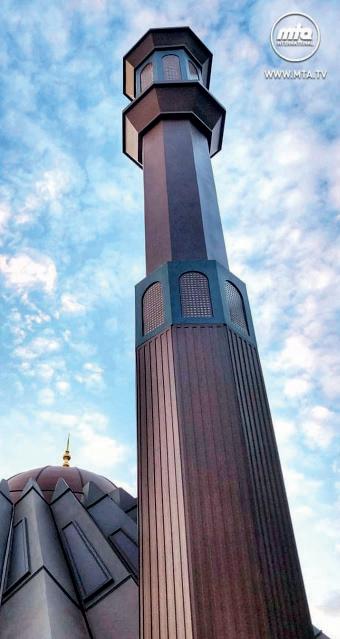
was bestowed upon him by God Almighty. In comparison, there was Taimur, who was a great king, however, he only became a king because of his worldly efforts. Napoleon was also a great leader; however, he became one through his own efforts and worldly planning. Nader Shah was also a great leader, however, he too became one only due to his personal efforts and worldly planning. All of them became leaders, however, we say that Taimur received his rule through people, whereas Abu Bakrra received his leadership from God Almighty. We say that Napoleon received his rule as a result of worldly planning, whereas Hazrat Umarra was bestowed leadership by God Almighty. We say that Genghis Khan obtained his leadership through worldly means, whereas Hazrat Uthmanra received leadership from God Almighty. We say that Nader Shah became a leader through worldly planning, whereas Hazrat Alira was bestowed leadership by God Almighty. Hence, they all became leaders. The worldly kings had power and influence and their laws were enacted, as was the case for the Caliphs. In fact, their [the worldly leaders’] rules were more strongly enforced than those of Abu Bakrra, Umarra, Uthmanra and Alira. However, these four were appointed leaders by God Almighty, whereas the worldly leaders were appointed by people. Therefore, when the Holy Prophetsa stated that whoever does not recite Bismillah [In the Name of Allah] before doing something important (he is speaking of the blessings associated with saying Bismillah) then such a person does not receive blessings. However, this does not mean that they do not achieve their purpose; rather, it means that their objective will not be fulfilled by God Almighty. The leadership granted by God Almighty was not meant to be bestowed upon anyone other than Hazrat Abu Bakrra, Hazrat Umarra, Hazrat Uthmanra and Hazrat Alira. The leadership attained by others was through Satan or through other people. Lenin, Stalin, and Malenkov did not recite Bismillah, yet they attained leadership. Roosevelt, Truman, and Eisenhower also did not recite Bismillah, yet they became leaders. They did not even know of Bismillah, nor did they have any reverence for it in their hearts. Thus, when the Holy Prophetsa stated that one cannot obtain blessings without reciting Bismillah, it did not mean that one cannot attain anything from God Almighty altogether. In fact, only those receive from God Almighty who recite Bismillah before every important action. Everyone can discern whether something that is received from God Almighty possesses more blessings than something received from other people. Leadership that is obtained through human efforts can also end, whereas leadership bestowed by God Almighty can never cease.”
If only Muslims understood this point. Despite reciting Bismillah, it seems they do so only as mere lip service, not from their hearts. Hazrat Musleh-e-Maudra further writes:
“Yazid was also a leader. He was extremely prideful and claimed to have great power. He destroyed the family of the Holy Prophetsa. (He even declared himself to be a Muslim). He killed the progeny of the Holy Prophetsa and he never adopted humility. (He remained haughty) and believed that
no one could stand up to him. Hazrat Abu Bakrra was also a leader; however, he was humble and meek. He used to say, ‘God Almighty has appointed me to serve the people and however long I am given to serve is a favour upon me.’ However, Yazid used to say, ‘I have obtained rule from my father. I can kill whoever I please and spare whoever I please.’ Apparently, Yazid’s rule was more powerful than that of Hazrat Abu Bakrra He used to say, ‘I am a hereditary monarch. Who dares to speak before me?’ On the other hand, Hazrat Abu Bakrra used to say, ‘What capabilities did I possess to become a leader? Whatever I have has been bestowed by God Almighty. I could not have become a leader through my own efforts. I am everyone’s servant. I am the servant of the poor as well as the wealthy. If ever I make a mistake, then take recompense right away. Do not ruin me on the Day of Judgement.’ A listener will wonder what this is; [it seems as if] he (Hazrat Abu Bakrra) does not even possess the same rank as the chief of a village. The same person might hear the words of Yazid and think that they resemble those of Roman and Persian emperors and that Yazid’s words are those of a ruler.
However, when Hazrat Abu Bakrra passed away, his children, grandchildren, great-grandchildren, and then the following generations, which go beyond grandchildren and great-grandchildren, were all equally proud of their kinship with Hazrat Abu Bakrra. Putting them aside, even those who are not related to Hazrat Abu Bakrra – those who have never even met him – still have tears in their eyes when they read these accounts. A fervour is brought about in their love [for him]. If ever someone speaks ill of him, they become impassioned. Hence, his progeny aside, even others are prepared to lay down their lives for his sake. Every Muslim says ‘radiAllahu ‘anhu [may Allah be pleased with him]’ when they hear his name. On the other hand, when the arrogant Yazid – who tired not of calling himself the king and son of a king – passed away, the people made his son the king in his place. One Friday, he stood at the pulpit and said, ‘O people! My grandfather became the king when there were others more worthy of becoming the king. My father became the king when others were more worthy of becoming king. Now I too have been made the king whilst there are others worthier of this. O people! I cannot shoulder this burden. My grandfather and my father usurped the rights of others more worthy, however, I am not prepared to usurp their rights. This is your Khilafat, give it to whomsoever you please. I am neither worthy of it, nor do I deem my grandfather and father to have been worthy of it. They seized control of the government in an oppressive and wrongful manner, and now I desire to return the right of those who are entitled to it.’ Saying this, he returned home. When his mother heard of this incident, she said, ‘Wretched one, you have humiliated your father and grandfather!’ He replied, ‘Mother, if God Almighty has granted you any wisdom, you would understand that I have not disgraced my father and grandfather, rather, I have restored their honour.’ He then remained in reclusion in his home, and did not go out until his demise.” (Khutbat-e-Mahmud, Vol. 34, pp. 86-88)
Hence one must also do justice to this
monarchy, which is granted by Allah the Almighty, and it is a lesson for Muslim leaders and kings.
Hazrat Musleh-e-Maudra states:
“Have the greatest kings of the world today attained the same grandeur of Hazrat Abu Bakrra due to his sacrifices for Islam and religion? Today there is not even a single king in the world who has achieved the same greatness as that of Hazrat Abu Bakrra. In fact, aside from Hazrat Abu Bakrra, the great kings of today do not even possess the same glory as that of the servants of Hazrat Abu Bakrra in the eyes of the Muslims. The truth is that even the dog of Hazrat Abu Bakrra is dearer to us than those of great eminence, because he served at the house of the Holy Prophet Muhammadsa.”
He then states, “When one has served at the household of Muhammadsa everything about them becomes admirable in our eyes, and then it is impossible for anyone else to erase that greatness from our hearts.”
(Khutbat-e-Mahmud, Vol. 19, p. 681)
They raise allegations against us, that God forbid we disgrace the Holy Prophetsa, but in reality, such are the views we hold.
Hazrat Musleh-e-Maudra states:
“One of Hazrat Abu Bakr’sra sons took some time to accept Islam. Once, the Holy Prophetsa was sitting in the mosque and various matters were being discussed.
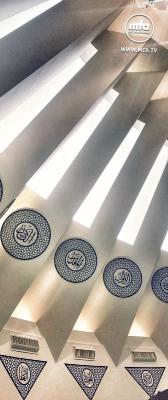
During the conversation, [the son] said to Hazrat Abu Bakrra, ‘Father, during a battle I was hiding behind a rock, and you passed by me twice. If I had desired, I could have killed you, but the thought that you are my father held me back from raising my hand.’
Hearing this, Hazrat Abu Bakrra said, ‘I did not see you at the time, but since you were on the battlefield as an enemy of Allah, had I seen you, I would have certainly killed you.’”
(Khutbat-e-Mahmud, Vol. 16, pp. 621-622)
In relation to the high morals of Hazrat Abu Bakrra, the Promised Messiahas states:
“Abu Bakrra was a man whose nature possessed the fuel and wick of goodness (i.e., he had the capability of burning bright). And so, the pure teaching of the Messenger of Allah, peace and blessings of Allah be upon him, touched him immediately and set him alight. He did not argue with the Holy Prophetsa at all; he did not ask to be shown any sign or miracle. As soon as he heard that the Holy Prophetsa had made his claim, all that he asked was: ‘Do you claim to be a Prophet?’ When the Messenger of Allah, peace and blessings of Allah be upon him, replied in the affirmative, he proclaimed: ‘Bear witness that I am the first to believe.’”
The Promised Messiahas states:
“Experience tells us that those who are particular about asking questions rarely attain guidance. However, those who think well of others and show patience fully partake of guidance. An example of this can be seen in Abu Bakrra and Abu Jahl. Abu Bakrra did not argue, nor demand a sign, but he was granted that which those who demanded signs were left without. He witnessed sign upon sign and in fact, he became a magnificent sign himself. Abu Jahl, on the other hand, argued, and did not refrain from his opposition and ignorance. He witnessed sign upon sign, but could not see. Ultimately, he became a sign for others and died as an opponent.” (Malfuzat [1984], Vol. 2, p. 165)
The Promised Messiahas states: “Abu Bakr, may Allah be pleased with
him, and Abu Jahl were both raised from the same soil – Mecca. The city of Mecca is the same Mecca where now tens of millions of people belonging to every rank and class of society gather from all parts of the world. Both of the aforementioned individuals were born in the same land. The first of them was guided due to his pure and blessed nature and righteousness, ultimately attaining the highest station among the Truthful. The second, however, is notorious for his mischief, ignorance, unjust enmity and opposition to the truth.
“Bear in mind that distinction can only be of two kinds: divine and satanic. Men of divine distinction receive renown and honour in heaven. Similarly, men of satanic distinction are famed among the spawn of Satan.
“In short, both of the aforementioned men existed in the same place. The Messenger of God, peace and blessings of Allah be upon him, did not differentiate between anyone. All of the commandments that were given to him by Allah Almighty, he conveyed to the people equally; but the unfortunate and wretched were left deprived, while the fortunate were guided and attained to a station of excellence. Abu Jahl and his ilk witnessed numerous signs and observed the light of God and His blessings, but all this went in vain.” (Malfuzat [1984], Vol. 2, p. 164)
The Promised Messiahas states:
“When the Holy Prophet’ssa advent took place in Mecca, Abu Jahl and Hazrat Abu Bakrra Siddiq were both present in Mecca. However, Abu Bakr’sra nature possessed the ability to accept the truth. Whilst returning [from his travels] even before Hazrat Abu Bakrra had entered the city, he enquired from someone of any recent news and was informed that the Holy Prophetsa had claimed to be a prophet. There and then, he immediately accepted and did not ask for any miracle or a sign, though later he witnessed countless miracles, and in fact, became a sign himself. On the other hand, Abu Jahl, who witnessed thousands of signs, but even then he did not refrain from his opposition and rejection and continued to deny [the Holy Prophetsa]. What was the reason behind this? They both were born in the same place, and yet, one became Siddiq [truthful] and the other, who was previously known as ‘Abu al-Hikam’ [father of wisdom] became known as ‘Abu Jahl’ [father of ignorance]. The reason behind this is because [Abu Jahl’s] nature did not bear any relationship with the truth. In short, matters pertaining to faith are dependent upon
this relationship. When one establishes a relationship with this then that in itself becomes one’s teacher and imparts the knowledge of the truths. This is the reason why those who incorporate this relationship within their nature serve as a sign in itself.” (Malfuzat [1984], Vol. 5, pp. 11-12)
The Promised Messiahas further states:
“My Lord has made it clear to me that as-Siddiq [Abu Bakr], al-Faruq [Umar], and Uthman, may Allah be pleased with them, were righteous and faithful, and that they were among those chosen by Allah and favoured with His bounties. Many of those endowed with spiritual insight had attested to their virtues. They left their homes for the sake of Allah and entered the battlefield in every campaign, paying no heed to the scorching heat of summer or the cold of winter nights. They rushed eagerly for the sake of the faith like one in the prime of youth. They inclined neither towards relatives nor non-relatives and left them for the sake of Allah, the Lord of the worlds. Their deeds carry a sweet scent and
their actions are fragrant. All this points to the verdant orchards of their high spiritual state and the blooming gardens of their good deeds. From the scent of this breeze, we can understand their true character, and
in its luminescence is reflected the light of their beings.” (Sirr al-Khilafah [Urdu Translation], pp. 25-26)

The Promised Messiahas further states:
“By Allah, He has made the two Sheikhs [i.e. Abu Bakr ra and Umar ra], and the third who is known as DhunNurain [the Possessor of Two Lights; i.e. Uthmanra], the gates of Islam and the foremost amongst the army of KhairulAnam [the Best of Mankind]. Whosoever rejects their status, and disregards the proof of their greatness, and attempts to disgrace them instead of honouring them, and insults and curses them, I fear for him a tragic end and the loss of his faith. Those who insult and curse the Khulafa’ and utter calumnies against them grow hard-hearted and become the target of divine wrath. I have seen this happen on numerous occasions and I declare openly that bearing hatred towards these Chiefs [of faith] is a sure way of depriving oneself of divine blessings. Whoever harbours animosity towards them shuts upon himself the gates of mercy and forgiveness. The doors of knowledge and divine realisation will not be open to him.” ( Sirr al-Khilafah [Urdu Translation], pp. 28-29)
The Promised Messiah as further states:
“How can you curse one whose truthfulness Allah has Himself
established? (Sometimes people use such phrases, which are wrong.) He was the one who, when he sought Allah’s help, was granted signs in his support and the mischievous plans of the wicked were foiled. Hazrat Abu Bakr ra saved Islam from great calamities and adversities. He got rid of those who were like serpents. He restored peace and tranquillity and, by the grace of Allah, the Lord of all the worlds, brought every mischief-maker to nought. As-Siddiq had innumerable virtues and blessings. All Muslims are indebted to him, and none can deny this but transgressors of the highest degree. Just as Allah enabled him to establish peace in the hearts of the believers and to extinguish the fire ignited by the heretics and apostates, He also made him the finest champion and custodian of the Holy Quran, and one who disseminated the clear Book of Allah the Almighty. He made great efforts in compiling the Quran and in researching its true order, as specified by the Holy Prophet sa. Tears would flow from his eyes to an even greater degree than the flowing of a spring, out of concern for the welfare of Islam.” ( Sirr al-Khilafah [Urdu Translation], pp. 57-58)
The Promised Messiah as further states:
“The Shia acknowledge the fact that Hazrat Abu Bakr ra accepted Islam at a time
when the enemy was in large numbers and he was the companion of the Holy Prophet sa during the intense hardship of the early days. Moreover, when the Holy Prophet sa left Mecca, he also left with him with utmost sincerity and endured the difficulties. He left his hometown, friends and the entire family and gave preference to God, Who is the most Benevolent. He also took part in all the battles and fought against the disbelievers and helped the Holy Prophet sa. Hazrat Abu Bakr ra was appointed as the Khalifa at a time when a group of hypocrites became apostates and many liars made claim of prophethood. Hazrat Abu Bakr ra continued to fight against them until peace and security had been established in the land once again and those who sought to instigate disorder were completely suppressed. When he passed away, he was buried beside the grave of the Holy Prophet sa, who is the chief of the Prophets and the Imam of the Virtuous. He was the beloved of God and never departed from the company of the Holy Prophet sa, neither in his lifetime and nor after his demise. After a separation for just a short duration, they once again met and he presented the gift of his love. It is rather strange that, despite what they assert (i.e. those Shia who level these allegations), Allah placed the grave of the Holy Prophet sa among two such individuals who were disbelievers, usurped the rights of others and were dishonest and He did not grant His beloved Prophet sa salvation from the torment of being placed next to Abu Bakr ra and Umar ra, in fact, He made these two individuals, who gave him trouble and hardship, as his companions both in this world and the hereafter, and, God-forbid, did not keep these two impure individuals away from the Holy Prophet sa. However, our Lord is completely pure from what they assert. (What they say is completely wrong.) In fact, Allah the Almighty placed both of these righteous individuals (that is Hazrat Abu Bakr ra and Hazrat Umar ra), in the company of the Imam sa of the Righteous. Indeed, in this, there is a sign for those who possess wisdom.” ( Sirr alKhilafah [Urdu Translation], pp. 72-73)
The Promised Messiah as further states regarding the prejudiced Shia: “If the prejudiced Shia were asked who was the first among the men to leave the community of the disbelievers and embrace Islam, they would have no choice but to say that it was Hazrat Abu Bakr ra. Then, if they are asked as to who was the first person to migrate alongside the Holy Prophet sa, who put all his relations to one side and
migrated to where the Holy Prophet sa was, they again will have no other choice but to say that it was Hazrat Abu Bakr ra Then, if they were asked that even if, for argument’s sake, he usurped [Khilafat], but who was the first to be appointed as the Khalifah, they will have no choice but to say that it was Abu Bakr ra. Then, if they were asked who compiled the Quran into a single volume in order to send it to different countries, they would undoubtedly say it was Hazrat Abu Bakr ra Then, if they were asked who is buried beside the Chief of the Prophets and the Chief of the Virtuous sa, they would have no choice but to say Abu Bakr ra and Umar ra. How strange is it that, Godforbid, all the distinctions were granted to disbelievers and hypocrites and all of the blessings of Islam were manifested through its opponents? Can any believer imagine that the person who was the first to embrace Islam was in fact a disbeliever and accursed? And the one who was the first to migrate with the Holy Prophet sa , was devoid of faith and an apostate? In this way, every excellence was granted to the disbelievers, even the close proximity to the resting place of the Holy Prophet sa.” ( Sirr al-Khilafah [Urdu Translation], pp. 75-76)
The Promised Messiahas then states:
“The truth is that as-Siddiq and alFaruq were eminent Companions. They never usurped anyone’s rights. Piety was their rule and justice was their intent. They would scrutinise all matters, manifest and hidden, with a critical eye. They had no worldly ambitions and had devoted themselves to the service of Allah. I have seen no one equal to these two in their magnanimity and in their support for the religion of the Prophet of the two realms. They were swifter than the moon in following the Sun of all mankind. They were completely engrossed in his love. They bore every hardship for the truth and happily accepted every humiliation for the matchless Prophet. They emerged like lions to face the armies of the unbelievers until Islam became victorious, the opposing armies were defeated, idolatry regressed, and the sun of faith and religion shone forth once more. Having thus rendered great services to Islam and having placed the Muslims under a debt of gratitude, they came to rest in the proximity of the Holy Prophetsa.”
The Promised Messiahas further states: “Allah is the Greatest! How sublime was their sincerity and loyalty that they were buried alongside the Holy Prophetsa. Had Moses and Jesus been alive, they would have envied such a great honour. This high status does not come by mere longing or desire; it is an eternal blessing from the Lord of Glory, and it is only destined for those who are eternally under divine grace.” (Sirr al-Khilafah [Urdu Translation], Ruhani Khazain, Vol. 8, pp. 345-346)
There are a few more references, which I shall narrate in the future, insha-Allah [God willing].
(Official Urdu transcript published in Al Fazl International, 23 December 2022, pp. 5-10. Translated by The Review of Religions .)